2019
2019
News 2019
17.12.2019: Advent, Advent - eco4fin project meeting in Oldenburg
In December the eco4fin team met in Oldenburg for the last quarterly meeting in 2019 to discuss the results achieved so far and to plan the start in 2020. The discussions focused on the creation of the next prototype version and communication to internal addressees. Various options were discussed.
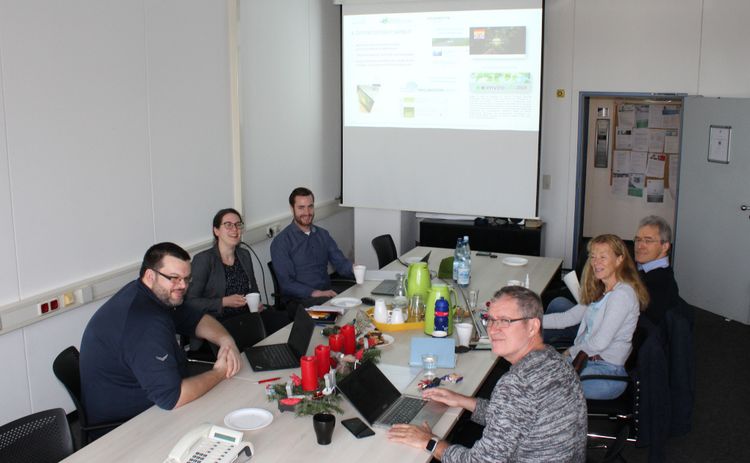
At the eco4fin project meeting participated: Dr. Ina Thurn (Volkswagen), Rainer Hartung (Volkswagen), Raphaela Helbig (Volkswagen), Prof. Dr.-Ing. Jorge Marx Gómez (VLBA), Cedrik Theesen (VLBA) and Dr.-Ing. Andreas Solsbach (VLBA).
10.01.2020: In the end of last year, the academic component of the CENIT@EA-Team
Oldenburg, 16.12.2019 – 18.12.2019
In the end of last year, the academic component of the CENIT@EA-Team gathered together at the University of Oldenburg to wrap up the preceding year and to strengthen their close collaboration for the upcoming time.
On the first day, the team attended a communication workshop to maintain the effectiveness of their existing communication techniques and to further increase the exchange of knowledge, thoughts and information as well as their successful implementation into the project. The workshop was supervised by Dr. Carolin Schöbel-Peinemann who is an expert for staff training at the University of Oldenburg.
Having obtained valuable insights during this part of the meeting, the team moved on to the coordination meeting. As first step the financial plan was drawn up until the beginning of 2021. It was then discussed how to further improve the teaching quality and the learning environment for an optimal learning environment for the students.
The last day of the meeting was dedicated for cultural programme, where the participants were taken for sightseeing through the city of Oldenburg.
CENIT@EA thanks everyone for their fruitful contributions and the decent outcome of the meeting and wishes all the best for the new year.
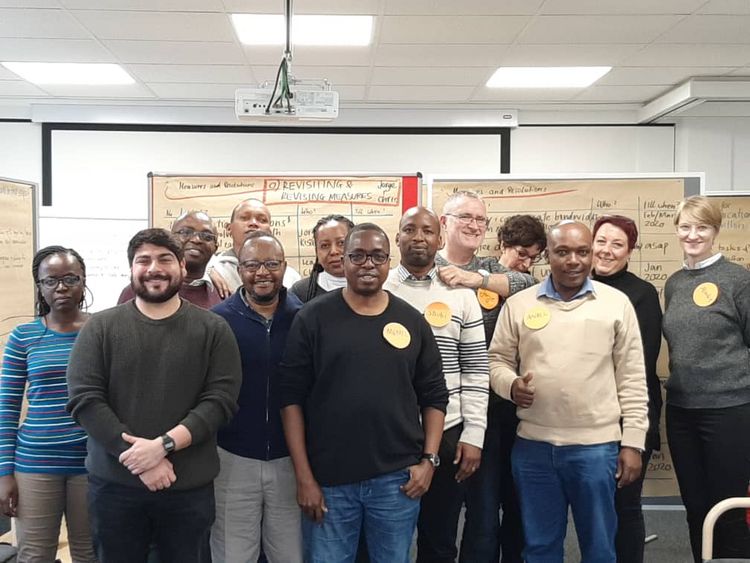
13.12.2019: Kickoff-meeting of the research project DIfa - Data Intelligence for Audit
In a three-year research cooperation between Volkswagen AG and the Department of Business Informatics / VLBA, data-based methods and procedures for audits are developed that enable the identification of process weaknesses, inconsistencies and manipulations in business processes.
The kick-off meeting for this research cooperation took place on Friday, December 13, 2019, at the premises of the Department of Business Informatics / VLBA. Among other things, the organizational and project structure as well as the specification of cooperation and external communication were discussed.
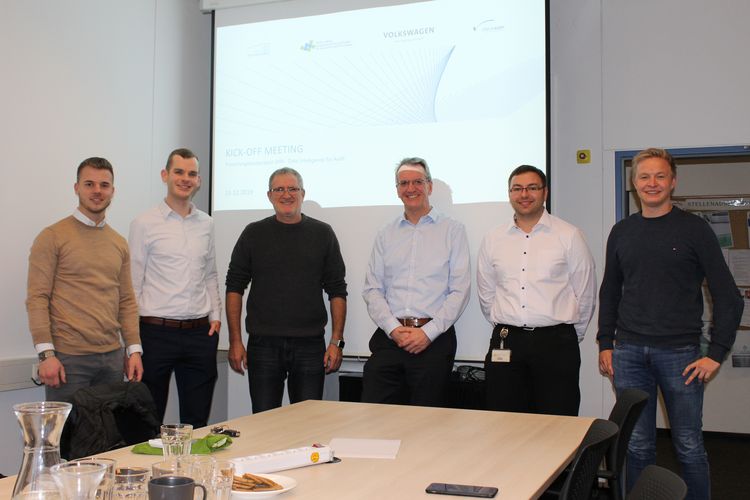
29.11.2019: ECOSense: Distribution of bicycle sensors started
The supplying of bicycle sensors as part of the ECOSense project to interested citizens in the Oldenburg area started successfully this week. More than 100 sensors were already applied to bicycles during the first few days. The chosen participants of the project include people from all age groups and districts as well as surrounding areas of Oldenburg.
The sensors will be distributed at the Technology and Start-up Center TGO by CoSynth and mein-dienstrad.de as well as at the entrance to the University library by the VLBA team. The sensors will be fixed at the bicycle frame with Velcro fastener and a cable tie as additional security.
In the ECOSense project a total of 400 bicycles in Oldenburg will be equipped with bicycle measuring technology over the coming months. The registration for the project, which is funded by the German Ministry and Transport and Digital Infrastructure BMVI in the mFUND programme, is still possible for anyone who is interested.
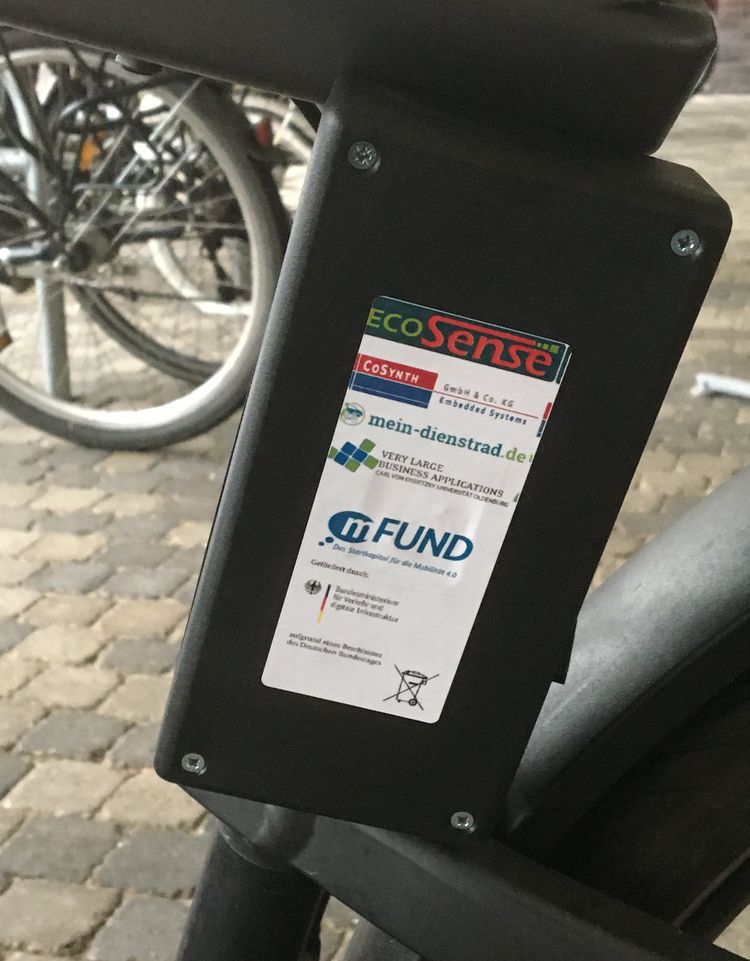
More than 100 citizens from Oldenburg received the bicycle sensors by the ECOSense project team this week.
21.11.2019: New SmartHelm project will support bike couriers at work
The partners of the newly launched SmartHelm project met up in Bremen at the 20th of November 2019 for an internal kickoff event to discuss the first working steps. In addition to the VLBA department and the City of Oldenburg, a total number of six other partners from business and research are involved in the development of an attention-sensitive bicycle helmet that is specifically designed to support bike couriers. The project is funded by the German Federal Ministry of Transport and Digital Infrastructure (BMVI) for a period of three years within the funding guideline Modernity Fund ("mFUND").
The internal kick-off meeting took place on invitation of lead partner RYTLE GmbH in Bremen Schwachhausen. The project partners had the opportunity to present their competences and main tasks in the project. Dr Christopher Kaan, administrative contact person of the ministry, answered all questions regarding the organizational process and gave an overview of the various exchange formats of the mFUND programme. A follow-up meeting, which will take place in January 2020 at project partner UVEX SPORTS GROUP GmbH & Co. KG in Fürth/Bavaria serves to discuss the more concrete technical design of the helmet and the components used.
The newly launched project SmartHelm focuses on the development of an intelligent connected bicycle helmet. SmartHelm is equipped with augmented reality glasses (AR), multilingual language control, an eye-tracking module for measuring eye movement data and special electroencephalography (EEG) electrodes to measure the cyclists attention. The aim is to better understand the stress factors in the daily work of bike couriers and to help prevent accidents or other dangerous situations by identifying critical situations at an early stage.
Further information about the project can be found on the website of the BMVI: www.bmvi.de/SharedDocs/DE/Artikel/DG/mfund-projekte/smarthelm.html
About mFUND:
As part of the mFUND research programme, the BMVI is supporting research and development projects on data-based digital innovations for mobility 4.0 since 2016. In addition to financial support, mFUND supports networking between actors from politics, business and research as well as access to the mCLOUD data portal with various event formats. Further information can be found at www.mfund.de.
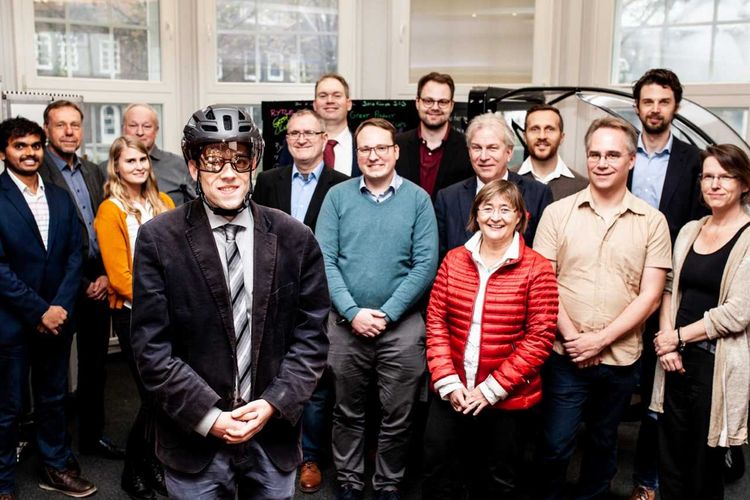 The bicycle helmets provided by project partner UVEX were mainly in the focus of the internal SmartHelm kickoff event in Bremen. (Source: RYTLE GmbH)
The bicycle helmets provided by project partner UVEX were mainly in the focus of the internal SmartHelm kickoff event in Bremen. (Source: RYTLE GmbH)
15.11.2019: ECOSense presented at bicycle municipal conference in front of nationwide representatives
The ECOSense project was introduced at this year's bicycle communal conference which took place at 12th of November in Wittenberg Lutherstadt to many cycling stakeholders. Representatives from all federal states and many municipalities showed great interest in the topic of bicycle sensors. Many actors from the administration were informed about the current progress of the project and discussed with Johannes Schering (University of Oldenburg, VLBA department) about the potentials of using ECOSense in other cities and regions outside Oldenburg. It became clear that many municipalities see a great need for new data to monitor cycling infrastructures. The annually event is designed and implemented by the Federal Cycling Academy in cooperation with the leading municipal associations: The German Association of Cities, the German Association of Counties and the German Association of Towns and Municipalities
The annual conference is primarily aimed at managers involved in cycling, as well as employees from the administrations of cities, districts and municipalities, regional and state authorities. This year around 270 cycling experts attended to the conference and the included workshops with focus on current issues in the promotion of cycling. Direct exchange and networking is the main focus of the Bicycle Municipal Conference, which will take place in 2020 at the Free Hanseatic City of Bremen.
About the mFUND of the BMVI:
The ECOSense project is funded by the Federal Ministry of Transport and Digital Infrastructure (BMVI) as part of the mFUND research initiative. Since 2016 mFUND supported more than 180 research and development projects on data-based digital applications with focus on mobility 4.0. In addition to financial support, mFUND supports networking between actors from politics, business and research as well as access to the open data portal mCLOUD with various event formats such as the mFUND conference. Further information can be found at www.mfund.de
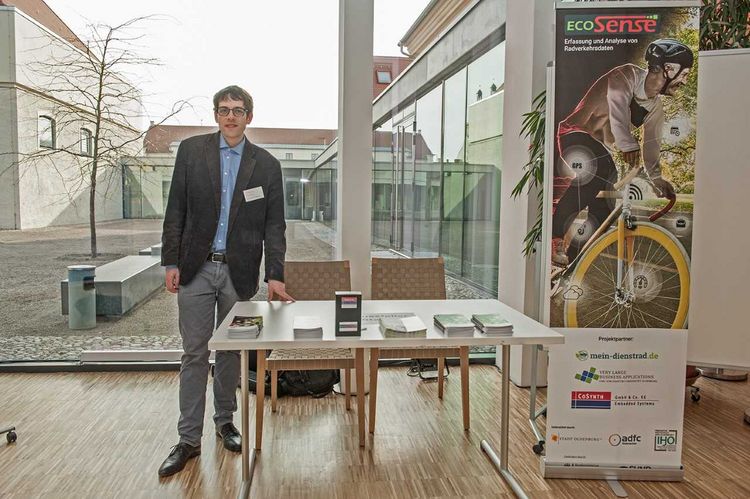
At this year's Bicycle Municipal Conference in Wittenberg Lutherstadt interested stakeholders of the bicycle sector had the opportunity to learn more about the research approach of the ECOSense project by project staff member Johannes Schering (University of Oldenburg, VLBA Department). (Source: DIFU)
14.11.2019: Funded by the DAAD project YESSS
In the frame of the project YEEES (Yields of Evocative Entrepreneurial Approaches on Environment and Society) funded by the DAAD (German Academic Exchange Service) the Research and Teaching workshop took place (11-15 November 2019 at Vechta University) with participants from Namibia, Mozambique, South Africa, Vechta University and Oldenburg University.
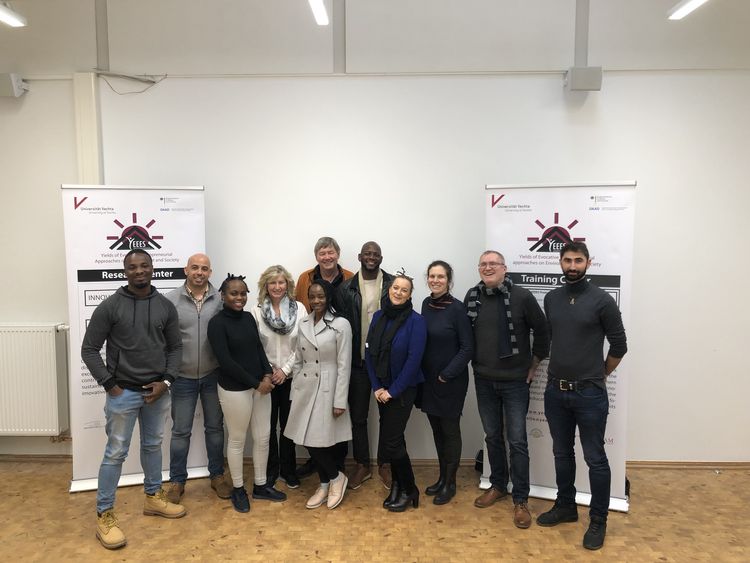
12.11.2019: Kick-Off-Meeting project instaride
Last Friday, 8th of November 2019, the kick-off meeting for ‘instaride’ took place in the premises of the Business Informatics Department / VLBA. The project aims at an innovative ride-hailing solution, which is meant to be developed within the two-year research cooperation between the innovation agency Granny&Smith, the Interdisciplinary Center for Law in the Information Society (ZRI) and the Department of Business Informatics / VLBA. The joint project is funded with ERDF-resources (EU) and supported by the municipality of Oldenburg.
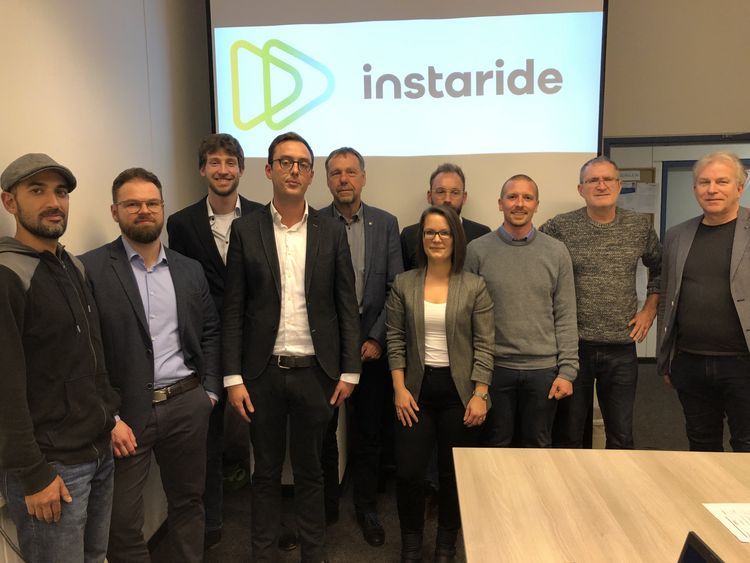
For further information please visit the VLBA website https://uol.de/en/vlba/projects/instaride and the official website www.instaride.de.
04.11.2019: Meeting on the Interreg project BLING
From 4-6 November 2019, the Steering Committee meeting for the Interreg project BLING (Blockchain in Government) took place at the University of Oldenburg. A total of 13 partners from the Netherlands, Denmark, Sweden, Belgium and Scotland are involved in BLING, including cities, regions, companies and authorities as well as four universities as research partners.
The BLING project has been funded by the EU's Interreg North Sea Program since the beginning of 2019 for three years with a total of around 4 million euros. The project is managed by the city of Groningen in the Netherlands.
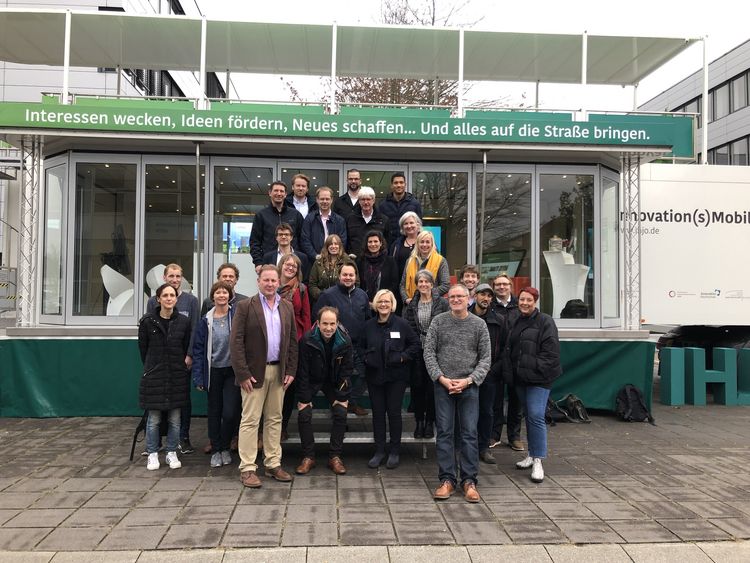
29.10.2019: VLBA for project meetings of TRACE and eco4fin in Wolfsburg
The employees Sven von Höveling, Cedrick Theesen, Jan-Philipp Awick, Jan-Hendrik Witte and Felix Kruse travelled together with Prof. Dr.-Ing. Jorge Marx Gómez to Wolfsburg to hold project meetings for the projects TRACE and eco4fin. The work results and discussions of the meetings were very successful.
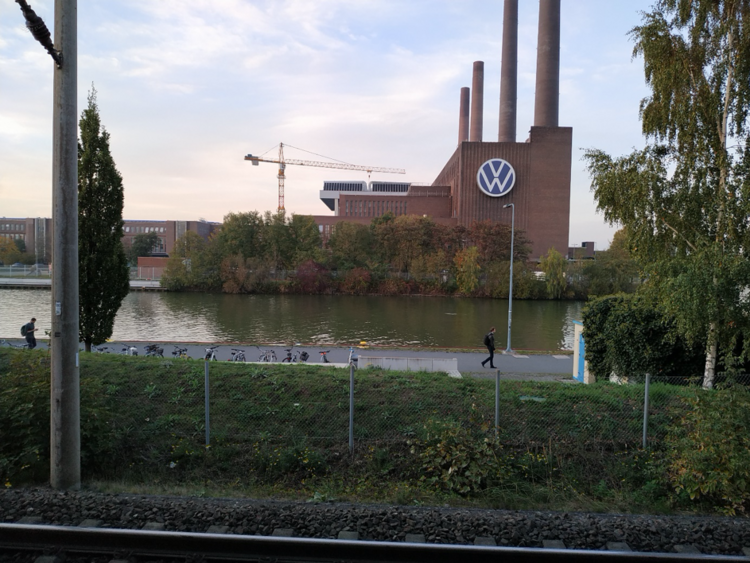
28.10.2019: ECOSense presented at mFUND exchange on bicycle mobility
Various data-based bicycle projects were recently presented to interested stakeholders in a special exchange format at the Federal Ministry of Transport and Digital Infrastructure (BMVI) in Berlin. The mFUND project ECOSense, in which the VLBA department will work on data analyses based on bicycle sensors in the forthcoming months, was also part of the event. The participants had the opportunity to exchange information on data-based innovations with focus on cycling and to discuss challenges and solutions within the funded projects.
In addition to ECOSense the mFUND projects FixMyBerlin, MOVEBIS (TU Dresden) and hochfein (Human Factors Consult) were also presented and discussed. Kyra Pelzner (mein-dienstrad.de) and Johannes Schering gave an overview about the goals and the current status of the Oldenburg based project. The project members were able to obtain valuable feedback by various experts from research and business especially on data evaluation and participant acquisition. The formats of the mFUND accompanying research which are all organized by the WIK Wissenschaftliches Institut für Infrastruktur und Kommunikationsdienste GmbH serve in particular to the further networking of relevant actors.
The ECOSense project will also be represented at the bicycle communal conference in Wittenberge Lutherstadt on 11th/12th of November. The event in Sachsen-Anhalt will involve many representatives of municipalities and traffic engineering from all over Germany.
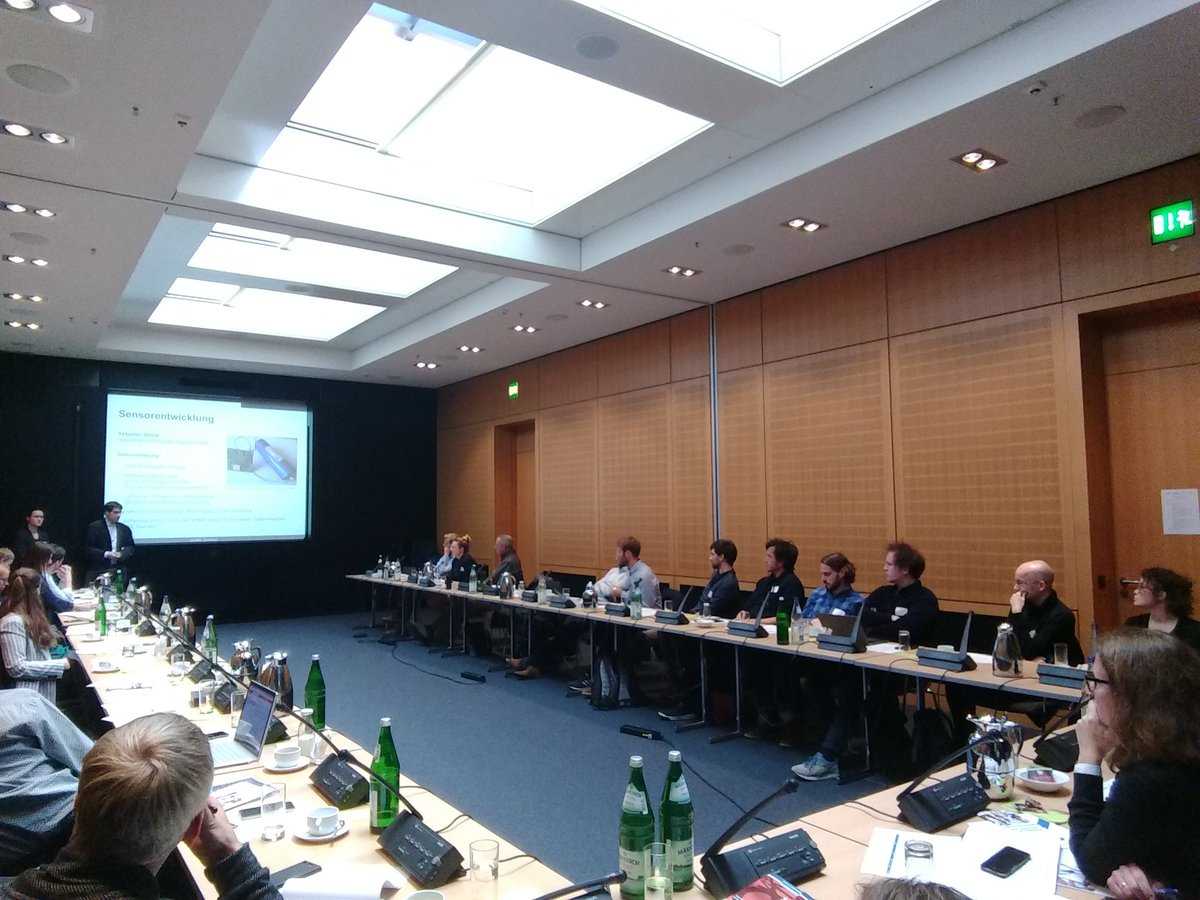
Kyra Pelzner (mein-dienstrad.de) and Johannes Schering recently presented the current working progress of ECOSense at the mFUND exchange format on bicycle mobility at the BMVI in Berlin. Source: WIK GmbH.
24.10.2019: NEMo at the second future[s]company 2019 on the topic "Mobility and innovations".
Digitalisation is changing the lives of all and has far-reaching effects on the competitiveness and innovative capacity of the German economy. The innovation potential is not only reserved for large companies and the high-tech industry. SMEs can also benefit from successful digital innovations and further training for their employees. The „Zukunft[s]unternehmen Nordwest” series of events shows examples of how science and industry can jointly meet the challenges of digital transformation with innovative solutions. A start-up, an established company, a young scientist and an experienced scientist provide answers based on current research. NEMo presented the central project results and highlighted local peculiarities.
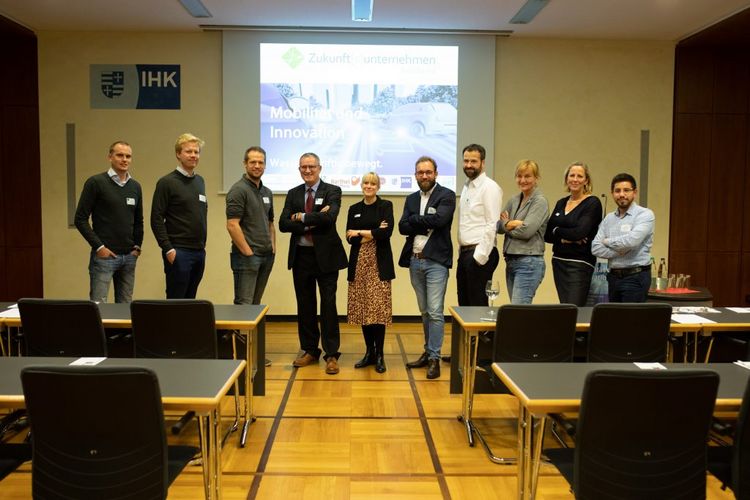 Group photo of the speakers at the second Zukunft[s]unternehmen 2019 on the topic "Mobility and Innovations”
Group photo of the speakers at the second Zukunft[s]unternehmen 2019 on the topic "Mobility and Innovations”
Pictures: Bonnie Bartusch // Start-up and Innovation Centre, Carl von Ossietzky University Oldenburg
Within the frame of the event, the research and practical contributions dealt with the following questions: What potentials and challenges arise for the Northwest region as a result of the mobility industry? Which cooperations help to open opportunities? Which sustainable and innovative mobility services can be implemented in digital business models? What possibilities do assistance and automation systems offer for intelligent vehicle technology?
24.10.2019: BITS partners discuss about further working steps
One of the main goals of the Interreg project BITS (Bicycles and Intelligent Transport Systems) is to make bicycle data from the North Sea region freely accessible to interested stakeholders. A core group project meeting recently held at the Province ofAntwerp in Belgium focused on the upcoming tasks regarding the data processing in the project. In particular the meeting dealt with the question of how the upcoming social science surveys can be coordinated with implementing the data platform to be developed (CycleDataHub) and how the data analysis of bicycle data can be harmonized with it.
The CycleDataHub will make a total of about 100 relevant bicycle data sets available over the project duration of three years. Best practice examples should also be presented there. When developing the platform VLBA works closely together with the Province of Antwerp which already provides various local cycling data as part of the so-called Fietsbarometer.
In addition to the Province of Antwerp and the VLBA department, representatives of the project partners Province of Overijssel, Cycling Industries Europe (CIE) and VIVES attended to the meeting. The next regular project meeting in February 2020 with all BITS partners will also take place in Antwerp.
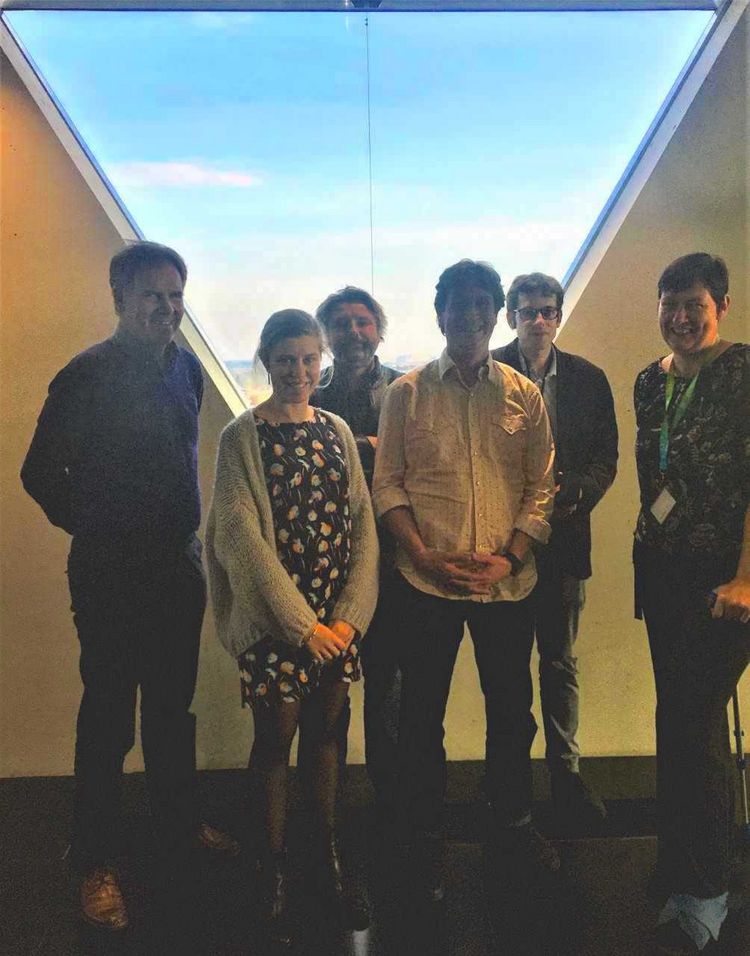
Several core partners of the BITS project recently met in Antwerp to discuss how to proceed in the development of the CycleDataHub.
24.10.2019. ECOSense Innovation Workshop demands for requirements on bicycle sensors
To learn more about the needs of different target groups for future sensor applications in the bicycle sector, the ECOSense project recently hosted an event at Schlaues Haus in Oldenburg. At the so called innovation workshop with associated partners from municipalities, urban and traffic planning and research, the project team discussed potential future scenarios for the sensors developed in the project. The results are to be incorporated into potential future projects.
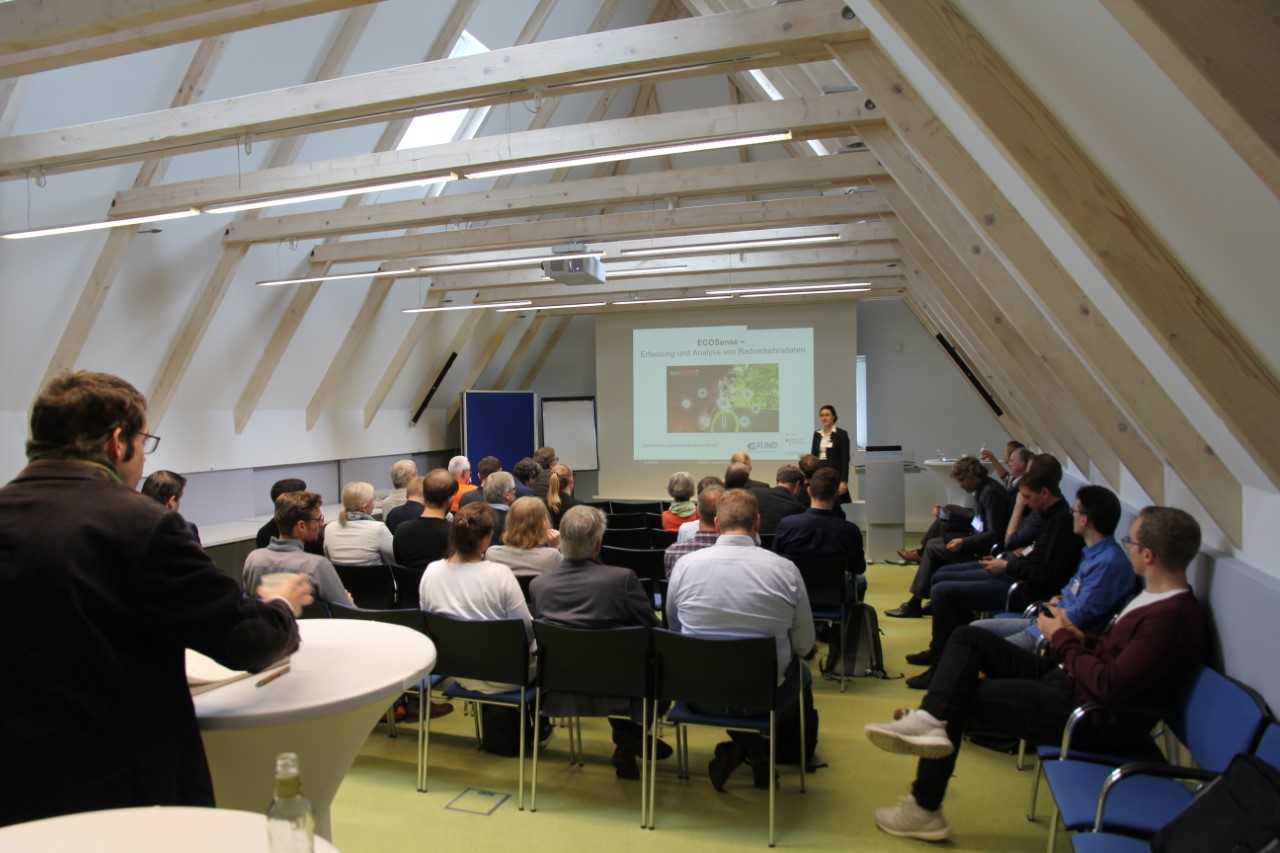
Experts from traffic engineering were able to learn more about ECOSense during the innovation workshop.
In order to introduce the relevance of the topic to the more than 40 participants, who travelled to Oldenburg from all over Germany, the workshop started with two short key notes. In his contribution, Peter Gwiasda from the Planungsbüro VIA based in Cologne pointed out the added values offered by the availability of suitable data for the design of bicycle infrastructures. Gwiasda, who is engaged in bicycle traffic planning for more than 30 years, addressed the possible advantages of a comprehensive use of bicycle sensors. Roland Hentschel from the city of Oldenburg, department for economy promotion, gave an overview of current and future challenges in the field of micromobility. The further dissemination of various sensors and the associated availability of new mobility data alone would not offer any concrete added values to the municipality. Future applications would have to be coordinated and made compatible in order to minimize conflicts between bicycles, cargo bikes, e-scooters and even larger modes of transport.
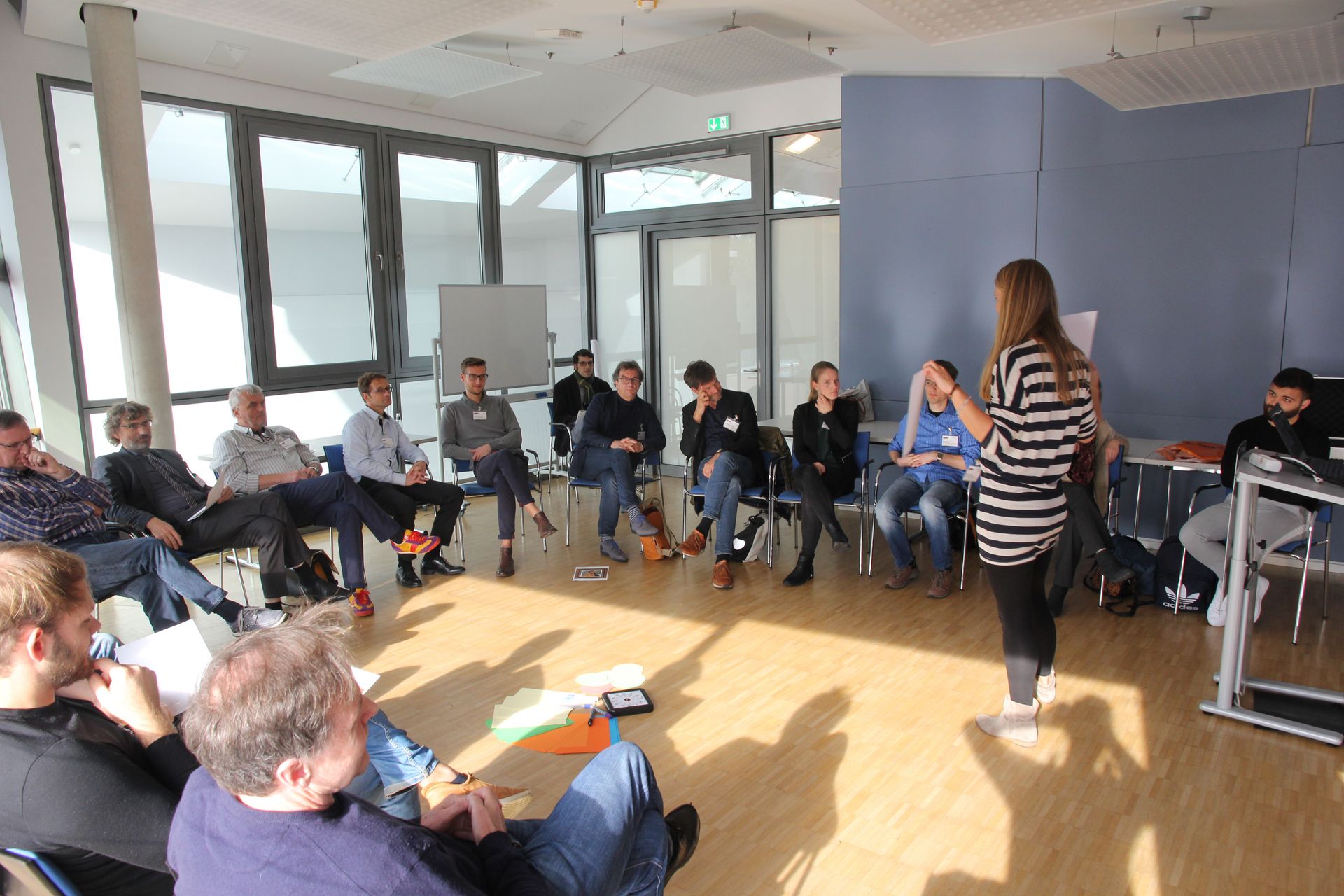
Joint ideas for the further development of bicycle sensors were created with the associated partners of ECOSense.
In the second part of the workshop, the participants worked together interactively to create new ideas on bicycle sensor applications. The first group critically evaluated the approach of the ECOSense project and discussed about further parameters which should be included in future sensors. For example, intelligent camera systems could be integrated in order to obtain more precise information in real time on the shape of the cycling network. The second group dealt with the question what specific needs different user groups as seniors or children might have regarding future bicycle sensor and data based products. To illustrate the considerable potentials for the further promotion of cycling, Gerard Tolner from the city of Groningen gave a brief overview of various initiatives in the Netherlands that already integrate a wide range of bicycle sensors.
Further information about ECOSense can be found on the official project website:
ecosense.mein-dienstrad.de
About the mFUND of the BMVI:
As part of the mFUND research initiative, the BMVI has been supporting research and development projects on data-based digital applications for mobility 4.0 since 2016. In addition to financial support, the mFUND supports networking between actors from politics, business and research as well as access to the mCLOUD data portal with various event formats. Further information can be found at www.mfund.de.
24.10.2019: Work in progress of a strategic analysis – eco4fin at the EnviroInfo 2019
It would be a dream for investors, politicians, and customers if sustainability-related company data was machine-readable and freely available Open Data. Such approaches exist for individual contents and regions, but they are not widespread worldwide and only concern a selective part of the thematic diversity of sustainability.
Sven von Höveling and Raphaela Helbig presented the current status of their strategic analysis at the "EnviroInfo" conference at the end of September 2019. The analysis considered a special new form of data provision by companies called "Corporate Sustainability Open Data". The two highlighted the potential of digitizing companies and processes. In addition, they derived some strategies from the situation analysis that could be taken into account in the development of software solutions.
Last but not least, the presentation provided a hanger for valuable Feedback and good conversations within the assembled researchers. The results of the strategic analysis will be incorporated into the further development of the prototype.

(Source: enviroinfo2019.org)
14.10.2019: Half-year presentation of the project group. WISdoM
On the 14th of October 2019 the WISdoM group of students held their midterm presentation at the university of Oldenburg. The project’s goal is to develop a scaleable informationplatform for different use cases in the domain of water economics. The project itself is part of a cooperation between the university’s department VLBA and the local water supplier Oldenburgisch Ostfriesischer Wasserverband (OOWV).
The midterm presentation gives an overview on the progress since 1st April 2019. The project’s vision is to develop an informationplatform that unifies multiple data sources and has the capability to check and analyze a given data source. Furthermore the platform is supposed to make information locateable and useable. Additionally all reports that were generated should be transparent and reproduceable.
The group of students uses milestones to plan and track their progress. Each milestone spans over one quarter of the project’s timeline. The first milestone was focused on teambuilding, organizational planning and selection of the given use cases. During this phase of the project the students held interviews at OOWV to get a better understanding of the five given use cases rainfall, groundwater, water demand forecasts, laboratory & quality and environment information act. One of their first tasks was to select three of these use cases to start their development process. Within this first quarter the students selected rainfall, groundwater and water demand forecasts. Following this decision a workshop for forecasts was conducted and requirements were documented using Story Cards. During this period other members of the group were focused on the development of a first prototype for the platform using existing data sources like Deutscher Wetterdienst, Genesis and Pegel online. At this point in time the project had three identified use cases, held interviews, one workshop was conducted, the first requirements were documented, their first prototype was running and the first data sources were visualized by the web client.
Following up on this successful first quarter is the progress of the second milestone. It consists of topics like data integration, software architecture, authorization and overall progress. The focus of the data integration efforts was to include anonymized customer, waterworks and rain data of the OOWV and external data sources like Deutscher Wetterdienst and Genesis. Under the hood every data source is attached to one or more services that provide access by a REST API. Furthermore each service provides the options for aggregation, sort and filter operations on the accessed data. It’s secured by an OAuth security service, which prohibits access to the platform by unauthorized users. On top of this security service a role system was implemented to manage users and data access. water demand forecasts can be forecast by a user using linear regression. The results are visualized by customizable diagrams and tables. More workshops were conducted to obtain requirements for the rainfall and groundwater use cases. These were documented using Story Cards and a click prototype was created during a google design sprint. During this timeframe the next milestones were planned and a poster was created. On top of this development progress the students optimized customer data and therefore increased the data quality of a given data source.
The midterm presentation ended by showing the planned progress for the next two milestones. During this time the group will focus on development of the platform itself as well as adding metadata and data versioning to all data sources. To conclude the presentation the group invited all listeners to further discuss the topics in more detail as well as access the platform freely.
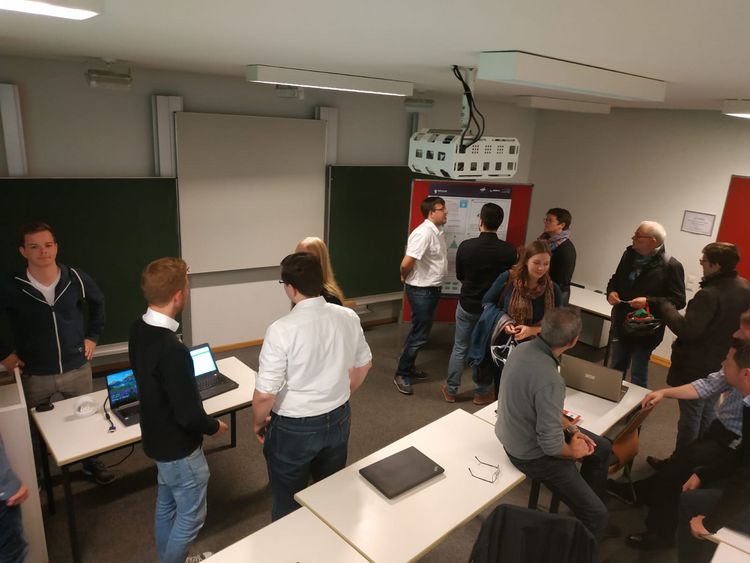
14.10.2019: Successful conclusion of the project group Plangine in the VLBA
On Monday, 14.10.2019, eleven students of the project group Plangine presented the results of their one-year project. A simulation engine and two scenarios from the field of environment and sustainability were developed.
After the presentation, the scenarios could be tested live by the audience. The students were supervised by Prof. Dr.-Ing. Jorge Marx Gómez, Dipl.-Inform. Barbara Bremer-Rapp and Dr.-Ing. Andreas Solsbach.
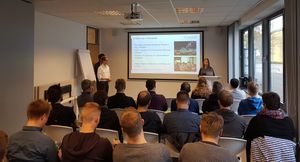

11.10.2019: Kickoff of the research cooperation "Propose.AI II"
On 11 October 2019 the kickoff meeting of the continued research cooperation between the VLBA department and the Oldenburg online optician Brille24 GmbH took place on the premises of Brille24. Among other things, the thematic orientation and the next steps of the cooperation were discussed. The cooperation project has a duration of three years (01.10.2019 - 30.09.2022).
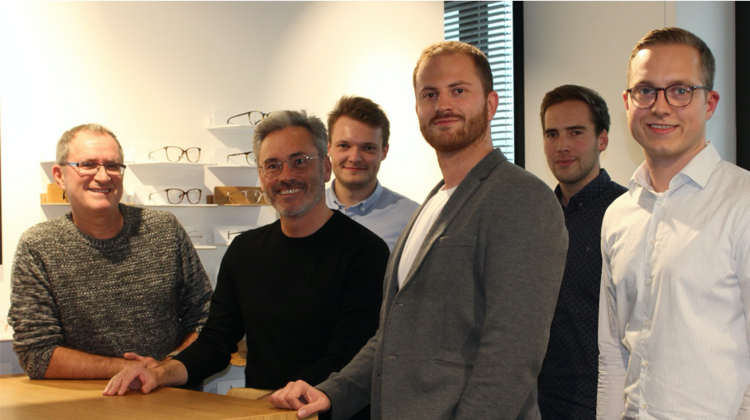
On the same day, the kickoff meeting of the project group that is now also starting took place. The twelve participants will work on identifying a person's clothing style using machine learning algorithms.
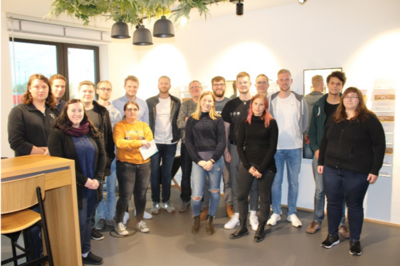
09.10.2019: A HOLISTIC VIEW OF DIGITALIZATION
The third workshop of the subproject Innovation(s)Labor digital took place on September 30, 2019 at the Innovation(s)Campus Jade Oldenburg under the direction of Prof. Dr. Marx Gómez. It was aimed in particular at companies, administrative and cultural institutions. The programme initially focused on impulses from science on the subject of "Taking a holistic view of digitisation: Dimensions of digital transformation and status in the region". Uta Strumpel from the Chair of Entrepreneurship at Oldenburg University gave insights into the results of the study "Digital Innovation in SMEs - Case Studies of Successful Digitisation Projects". In a second short presentation, Timo Kasselmann presented nine dimensions of the digital transformation of companies based on the St. Gallen House of Digital Business. In the second phase of the workshop, the experiences of the participants and the presented dimensions of the digital transformation were combined to form a picture of digital transformation in the region. In addition to insights into content, new contacts and impulses, the participants also got a first impression of the Innovation(s)Campus location and an outlook on upcoming events.
Results
An important result of the workshop was the realization that the digitization projects of the companies and cultural institutions are very diverse. Depending on the project, different dimensions are important. The results of the thematically similar workshop with IT and consulting companies held in mid-June contrast with this: IT and consulting projects on digitisation primarily concern the dimensions of process digitisation, product and business model innovation or customer experience.
Together, the two workshops show that in the course of the digital transformation of entire organizations, all dimensions of the model are relevant. In addition, the projects considered suggest that companies are increasingly turning to the support of consulting firms for topics such as process digitization and product innovation, while they themselves are mastering the tasks of transformation management and the further development of corporate culture.
Outlook
After the focus on management topics and the holistic view of the digital transformation of companies in the past events, technical topics will increasingly be the focus in the future. Among other things, events on topics from the fields of data science (artificial intelligence, data integration, data management, blockchain), open source software as well as digitization and sustainability are planned.
Contact
If you are interested in similar or upcoming events or in the project in general, please contact Malte Schulz or Timo Kasselmann from Innovation(s)Labor digital (digilab@ihjo.de).
Photos: Nele Claus
04.10.2019: Presentations NEMO and ECO-Sense at SuMoCoS 2019 in Uzbekistan
Within the project "Sustainability and Mobility in the Context of Smart Cities" (SuMoCoS), which is funded by the German Federal Ministry of Education and Research, conference from 07th to 12th October 2019 in Tashkent, Uzbekistan, Dr.-Ing Andreas Solsbach gave the following presentations on topics of the department Business Informatics / Very Large Business Applications: "NEMo - Mobility platforms as a key element for sustainable mobility" and "ECOSense - Collection and analysis of cycling data".
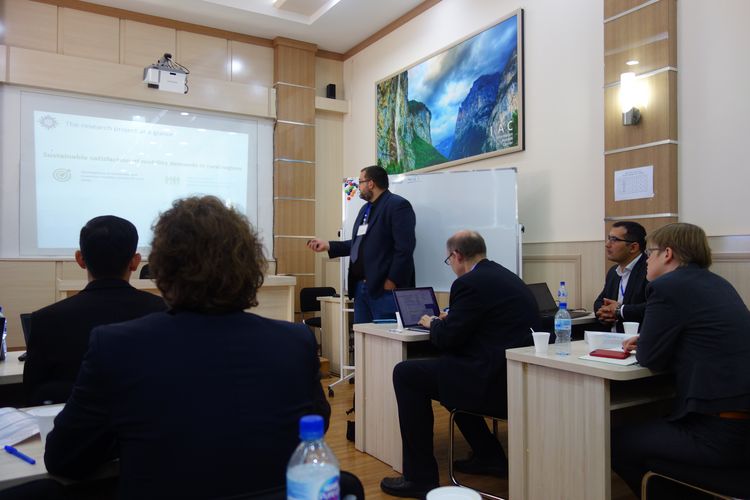
Source: “NEMO-Presentation” – Picture taken by Johannes Meier
01.10.2019: Kick-off PG ROCIT
On October 1, 2019 the project group ROCIT (Real-time forecasts Optimization Concerning timetable Information of public Transport) was launched. The students will work on optimizing the realtime forecast in the public transport sector. They will be supported by Barbara Rapp, Cedrik Theesen, and Jorge Marx Gómez, as well as AMCON GmbH.
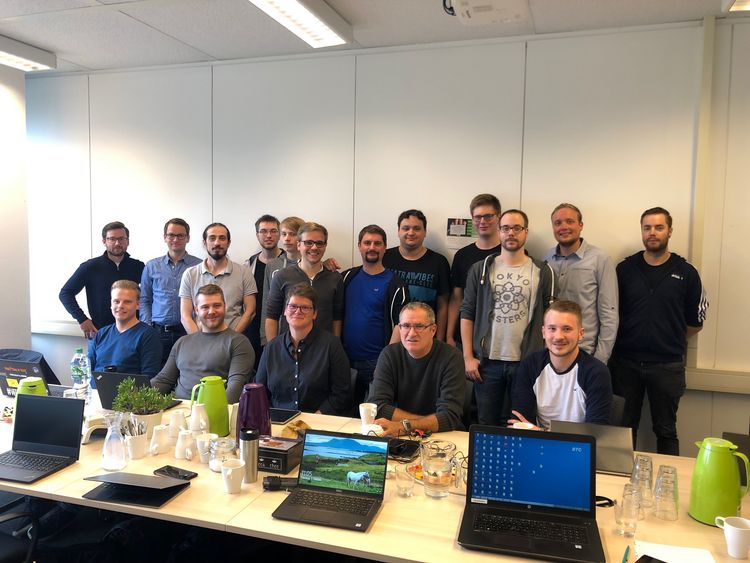
27.09.2019: ECOSense presented at the mFUND conference in front of nationwide audience
The Federal Ministry of Transport and Digital Infrastructure (BMVI) organises the annual mFUND conference to promote exchange and networking among funded projects related to mobility data. The VLBA department and the project ECOSense were also represented at this year's event which took place at the Allianz Forum in Berlin at the 26th/27th of September. The current project on bicycle sensor technology was presented to the interested specialist audience in the forum "Condition assessment and monitoring of traffic infrastructures".
VLBA employee Johannes Schering and Kyra Pelzner (mein-dienstrad.de) gave an overview on the objectives of the mFUND study on bicycle traffic and were able to obtain important feedback for the further development of the project during the discussion with experts from diverse fields. In addition to ECOSense, the projects DatEnKoSt, FreeRail,Inspektion_mit_UAS and DiMaRB were introduced to the interested specialist audience as part of the session as well. In all projects, a wide variety of sensor systems (e.g. based on drone technology) are used to obtain new data on the state of the transport infrastructure.
Further information on the mFUND conference can be found on the official website:
www.mfund-konferenz.de/
About mFUND of the BMVI:
Since 2016, the BMVI funded more than 180 research and development projects on data-based digital applications for mobility 4.0 as part of the mFUND research programme. In addition to financial support mFUND supports networking between actors from politics, business and research as well as access to the mCLOUD data portal with various event formats, such as the mFUND conference. Further information can be found at www.mfund.de.
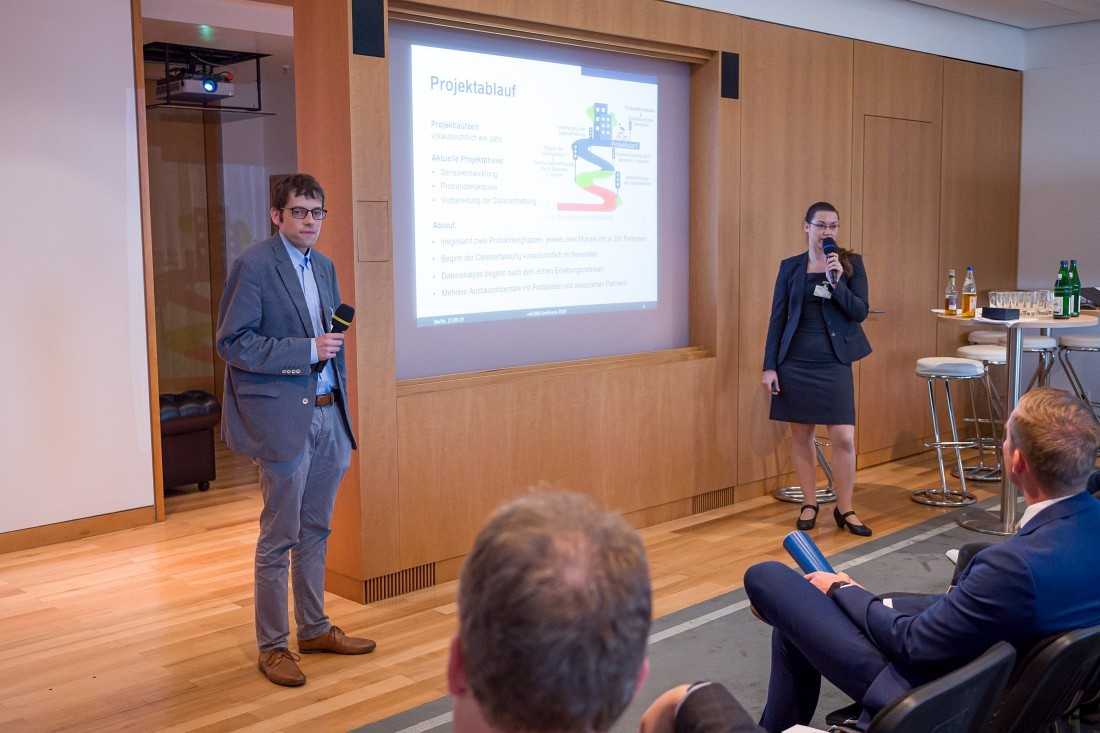
Johannes Schering and Kyra Pelzner (mein-dienstrad.de) introduced the goals and current working progress of the ECOSense project at the mFUND conference at the Allianz Forum in Berlin. Source: BMVI.
18.09.2019: Final event of the Data Challenge 2019
The final event of this year's Data Challenge took place on 18.09.2019. The aim of the challenge was to develop intelligent solutions for automated and standardized data extraction from the unstructured data sources provided by worldiety GmbH. The central challenge was to find processes and methods that could be generalized and then transferred to previously unknown data sources.
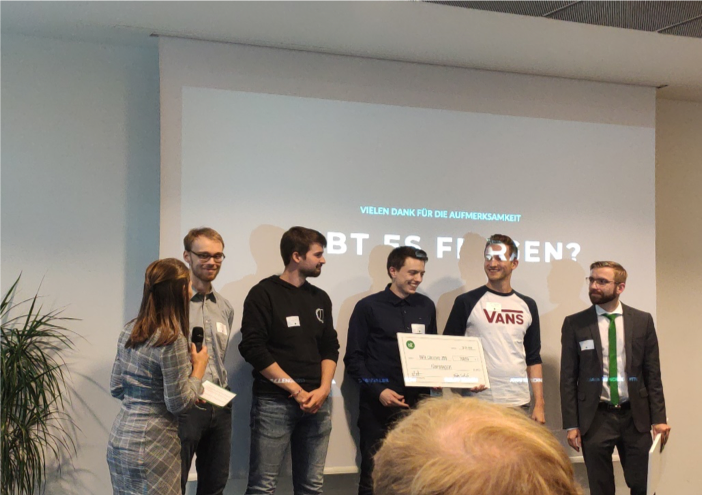
17.09.2019: Disputation von Ruthbetha Kateule
On the September 17th, 2019 MSc Ruthbetha Kateule successfully defended her PhD thesis entitled "Reference Architecture for Smart Environmental Information Systems". Congratulations from VLBA team.
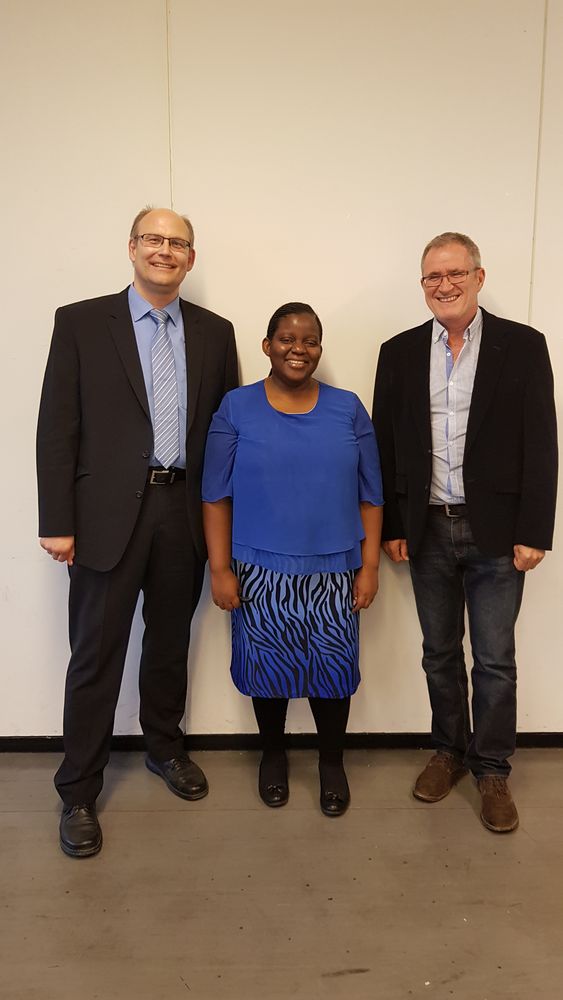
12.09.2019: Project on bicycle sensors officially presented at German Ministry of Transport
Following the internal kickoff in June, the newly launched ECOSense project was officially presented at the Federal Ministry of Transport and Digital Infrastructure (BMVI) in Berlin. The study, in which the VLBA department and the two Oldenburg companies Baron Mobility Service and CoSynth are involved, focuses on the development and implementation of a sensor system for the collection of bicycle data. The project is funded by the BMVI as part of the funding programme mFUND. During the meeting with Dr. Christopher Kaan, administrative contact of the BMVI, remaining questions for optimal project implementation were clarified.
Mrs Kyra Pelzner (Baron Mobility Service) guided through the presentation and presented the current progress of the project. Mr. Eduard Sartison (CoSynth) explained the technical design of the bicycle sensor more in detail. The current state of development of prototypical measurement technology already makes it possible to determine whether a cyclist is riding on the bicycle path or directly on the road. VLBA employee Mr. Johannes Schering reported from the research perspective how to deal with the bicycle data collected in the project. Since ECOSense is a feasibility study, one of the main goals of the project is to highlight the possibilities of future data analyses and potentials of the newly generated bicycle data. Due to the very comprehensive steps in the development and dissemination of bicycle sensors, the project duration is expected to be extended to 12 months until the end of May 2020.
In addition, various other mFUND projects were identified which appears to be particularly suitable for cooperation with ECOSense. In order to facilitate a direct exchange among other funded consortia, the BMVI will presumably organise a format for mFUND accompanying research in autumn, which will include many projects with focus on cycling. Furthermore, the project on bicycle sensors from Oldenburg will be presented to the interested public at the upcoming mFUND conference on 27 September in Berlin. Finally, it was discussed how ECOSense could be continued after completion of the feasibility study in the context of follow-up projects.
The study wants to examine the feasibility with regard to suitable parameters for a measuring technique that is directly attached to bicycles. It is expected that the bicycle sensors will be distributed to interested citizens in the Oldenburg area beginning from November. Registration for participation is possible via the official project website. The newly generated infrastructure and environmental data of the cyclists will be linked with further relevant information and evaluated by the VLBA in the course of the project. The project is supported by the city of Oldenburg, the ADFC Niedersachsen and a number of other associated partners from all over Germany.
Further information can be found on the official project website:
About the mFUND of the BMVI:
As part of the mFUND research initiative, the BMVI has been supporting research and development projects on data-based digital applications for mobility 4.0 since 2016. In addition to financial support, the mFUND supports networking between actors from politics, business and research as well as access to the mCLOUD data portal with various event formats. Further information can be found at www.mfund.de.
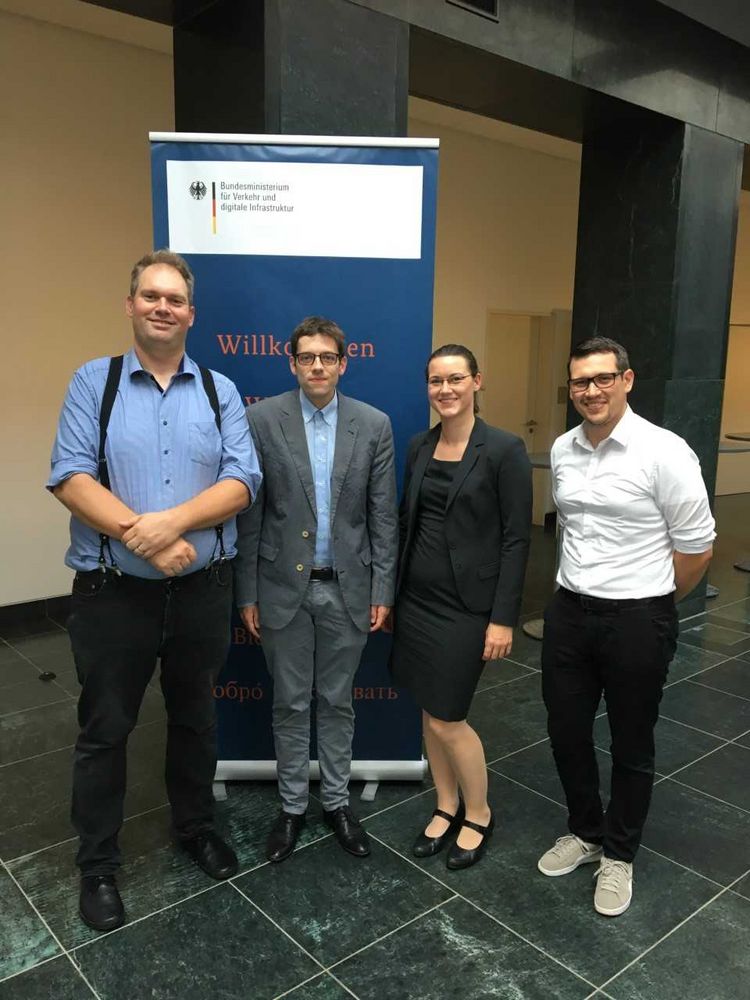 The project team led by Johannes Schering, Kyra Pelzner and Eduard Sartison (from left to right) were able to discuss further details on the implementation of ECOSense with Dr. Christopher Kaan during the official kickoff at the BMVI.
The project team led by Johannes Schering, Kyra Pelzner and Eduard Sartison (from left to right) were able to discuss further details on the implementation of ECOSense with Dr. Christopher Kaan during the official kickoff at the BMVI.
06.09.2019: VLBA meets abat AG
On 06.09.2019 the HQ of the abat AG in Bremen was visited by 14 Master students (Business Information Systems) from Oldenburg. The excursion was an integral part of the teaching module "Customizing using SAP as an example". The aim of the event was to give the students an insight into the practice and to exchange ideas on exciting topics from the SAP environment, which were explained using selected examples.
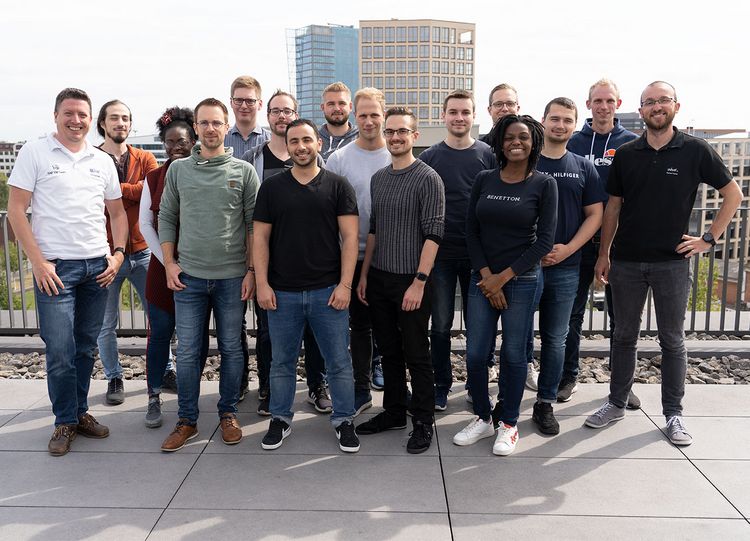
05.09.2019: Preparatory meeting HEdIS Summer School 2019
On the 29 of August 2019 the preparation meeting for the DAAD HEdIS Summer School (25 November - 6 December 2019) in South Africa took place. Participants were the students (granted with a scholarship) from Computer Science, Business Informatics and Sustainable Economics and Management as well as the supervisors Barbara Rapp, René Kessler, Felix Kruse, Roland Hentschel, Prof. Dr. Helmut Faasch (Uni Lüneburg) and Prof. Dr. Marx Gómez.
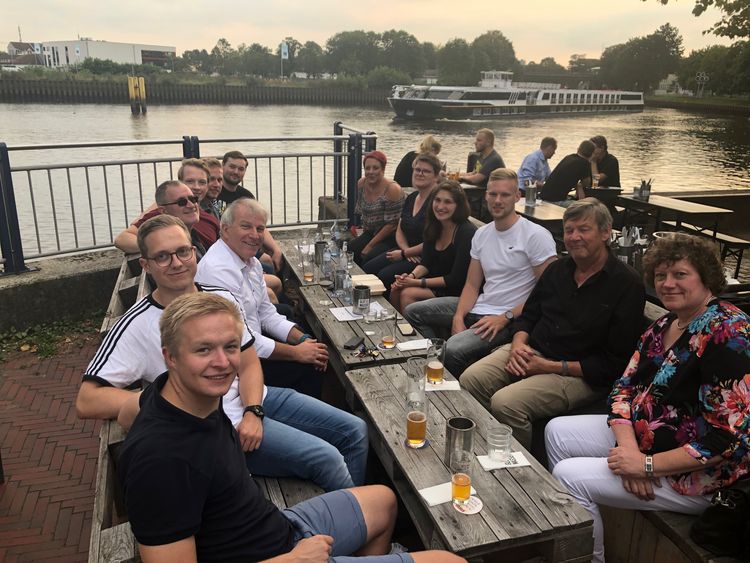
04.09.2019: Officially celebrate the launch of the Centre of Excellence for Information Communication and Technology in East Africa (CENIT@EA)
Arusha, Tanzania: On 23th August 2019 government officials, university members and visitors came together to officially celebrate the launch of the Centre of Excellence for Information Communication and Technology in East Africa (CENIT@EA). In the region it is the first of its kind that aims to empower and educate students to become qualified personnel in the field of Embedded and Mobile Systems (EMoS).
The celebration was attended by representatives of the academic consortium (University of Oldenburg, The German Aerospace Center, University of Applied Sciences for Engineering and Economics Berlin, University of Applied Sciences Mannheim, University of Technology and Arts of Byumba, University of Dar es Salaam and the Nelson Mandela African Institute for Science and Technology) representatives of the implementation partners (German Academic Exchange Service, German Corperation for International Cooperation and the Inter-University Council for East Africa), regional representatives and network partners of the East African Community.
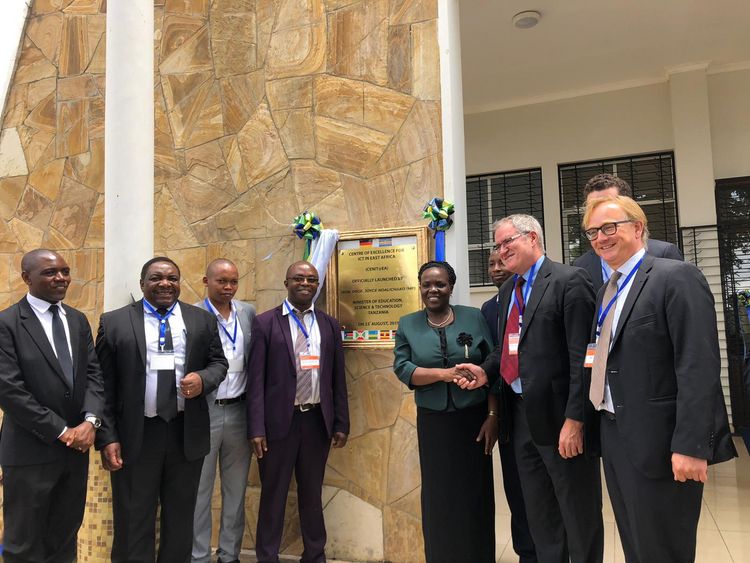
CENIT@EA is happy for the successful launch and looking forward to creating a positive impact for our students and the whole region!
28.08.2019: Center of Excellence opened in East Africa
Over the past two years, Oldenburg business IT specialists and partners have established a centre of excellence for information and communication technologies in Tanzania. Now the festive opening of the "Centre of Excellence for ICT in East Africa" (CENIT@EA) has taken place in the capital Arusha. Among the participants was Prof. h.c., Tanzania's Minister of Education. Joyce Ndalichako. The Center of Excellence will focus on so-called embedded and mobile systems and aims to strengthen education and research in this area at African partner institutions. The core of the programme is a master's programme entitled "Embedded and Mobile Systems", which began in June with the first 28 scholarship holders.
Further information: www.presse.uni-oldenburg.de/mit/2019/281.html
14.08.2019: Summer project meeting in Wolfsburg
In mid-August, the project team presented the results of the last project quarter. The meeting took place in Wolfsburg. Focus was on the first version of the prototype.
All project participants were satisfied with the results so far and there was a constructive discussion about improvements and further functions of the prototype as well as about the project as a whole.
Participants of the meeting: Dr. Ina Thurn (Volkswagen), Dr. Torsten Gailus (Volkswagen), Raphaela Helbig (Volkswagen), Prof. Dr.-Ing. Jorge Marx Gómez (VLBA), Dr.-Ing. Andreas Solsbach (VLBA), and Sven von Höveling (VLBA).
14.08.2019: Exchange with TU Braunschweig on bicycle projects
The Institute of Design Engineering (Institut für Konstruktionstechnik, IK) of the Technical University of Braunschweig recently visited the Department of Information Systems VLBA. With the two engineers Anja Cudok and Alexander Brandies, the VLBA members Alexander Sandau and Johannes Schering discussed possible starting points and project ideas in the field of sustainable mobility. In addition to the NEMo project, various research approaches in the field of smart cycling were discussed. In this context the scientists from Braunschweig presented the newly launched BMBF funded project lifecycling², which aims to improve the resource efficiency of electric cargo bikes.
With its research focus on vehicle concepts, the IK is part of the Lower Saxony Research Center for Vehicle Technology (Niedersächsisches Forschungszentrum Fahrzeugtechnik, NFF) and contributes methodological expertise to the development of overall vehicle concepts. New approaches to vehicle technology are developed through a holistic approach to design methods, thus making a significant contribution to future mobility.
Further information can be found on the website of the Institute of Design Engineering.
www.tu-braunschweig.de/ik/
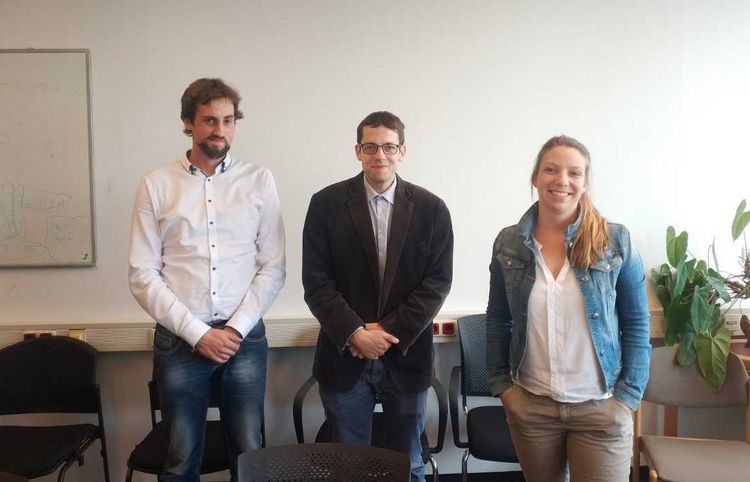
08.08.2019: Disputation of Safwan Sulaiman
On the August 8th, 2019 MSc Safwan Sulaiman successfully defended his PhD thesis entitled "Knowledge Transfer-based Recommendations to enable Self-Service Business Intelligence". Congratulations from VLBA team.
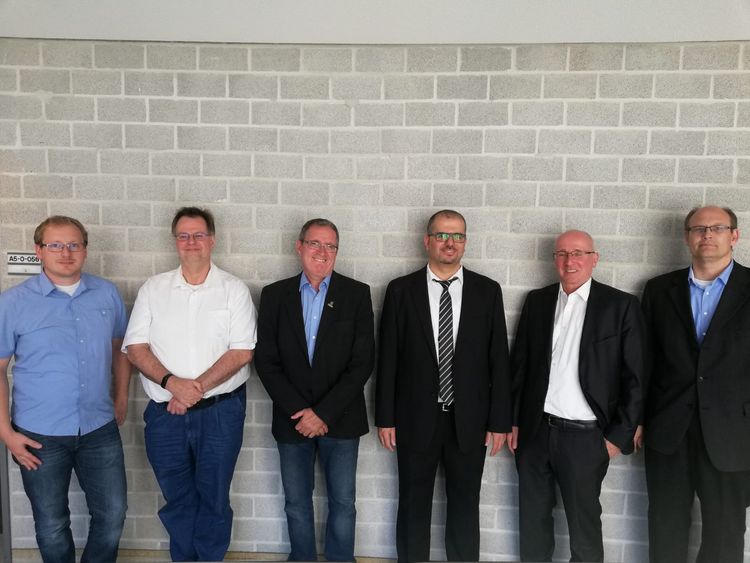
08.08.2019. NEMo achieves excellent ranking at Austrian mobility award
At the Mobility Award 2019 of the VCÖ (Austrian Association of Traffic, Verkehrsclub Österreich) the research project NEMo was elected on the top five of all submitted projects by a jury of experts. Thus, the German project on mobility in rural areas made it into the narrowest final selection of the Austrian competition. As part of the award NEMo is presented in the VCÖ project database along with many other flagship projects from now on under following link.
mobilitaetsprojekte.vcoe.at/nemo-nachhaltige-erfllung-von-mobilittsbedarfen-im-lndlichen-raum--2019?oder3=2050
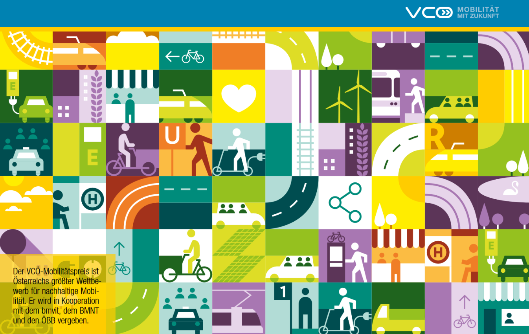
Picture source: Verkehrsclub Österreich (www.vcoe.at/files/vcoe/uploads/Mobilitaetspreis%202019/Wien/MP2019_Basis_de_v2.pdf)
At the VCÖ mobility award ceremony which takes place on 17th of September 2019 in Vienna, the inter- and transdisciplinary research project NEMo, in which three universities from Lower Saxony are involved, will also be mentioned among the top five projects in a presentation. This year, NEMo is among the best five submissions in the category "Research and Scientific Studies".
The VCÖ Mobility Award is Austria's largest competition for sustainable mobility. It is awarded in cooperation with the Austrian Ministry of Transport, the Austrian Ministry of Sustainability and ÖBB. The slogan of this year's competition is "Mobility Turnaround". In this year's call for projects a total of 388 applications were submitted to the VCÖ.
Projects and measures that have been implemented as well as concepts, pilot projects and ideas that have not yet been implemented as well as research work that contributes to the mobility turnaround can participate. Companies, start-ups, municipalities, research and educational institutions, associations, students, initiatives and private individuals can participate. Projects that do not take place in Austria, as in the case of NEMo, can also apply.
08.08.2019: HAPTIK meeting and workshops
In the project HAPTIK project meetings and workshops took place in July and August. From 24 to 25 July, DB Schenker held its half-yearly meeting with all its alliance partners in Frankfurt am Main. The progress of the project was discussed and the interim results presented to the internal DB Schenker project public. This resulted in exciting discussions and interesting feedback.
On 6 August, a workshop was organised in cooperation with the Maritime Cluster of Northern Germany in which various players from the maritime sector took part. The aim of the workshop was to make the project better known in the maritime world and to receive feedback from the industry.
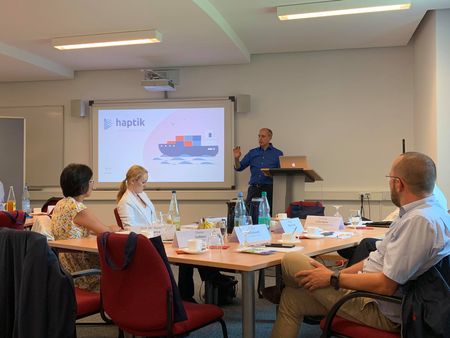
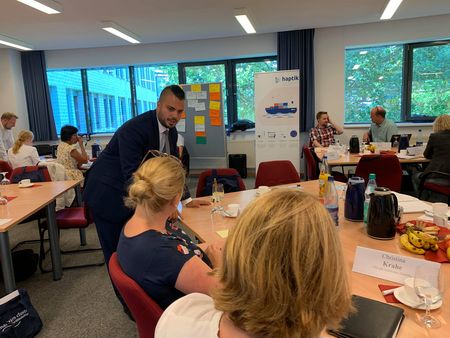
25.07.2019 Association of the bicycle industry interested in cooperation with VLBA
Verbund Service und Fahrrad e.V. (VSF), the German Association of the bicycle industry, recently visited the Department of Business Informatics VLBA. The managing director of VSF Mr. Dirk Sexauer discussed with Prof. Dr.-Ing. Jorge Marx Gómez and Johannes Schering about starting points of new research and potential project ideas. As a result, common projects of VSF and VLBA could be developed in the field of business related environmental information systems (BUIS) with a special focus on bicycle retailing.
VSF, founded in 1985 in Berlin, acts as a non-profit association in the bicycle segment. Among the more than 300 members are bicycle dealers, manufacturers, wholesalers, service providers and non-profit organizations. VSF is dedicated to attractive bicycle retailers, innovative new products for cyclists as well as networking and exchange of experience in the bicycle industry.
Further information can be found on the websites of VSF.
www.vsf.de/
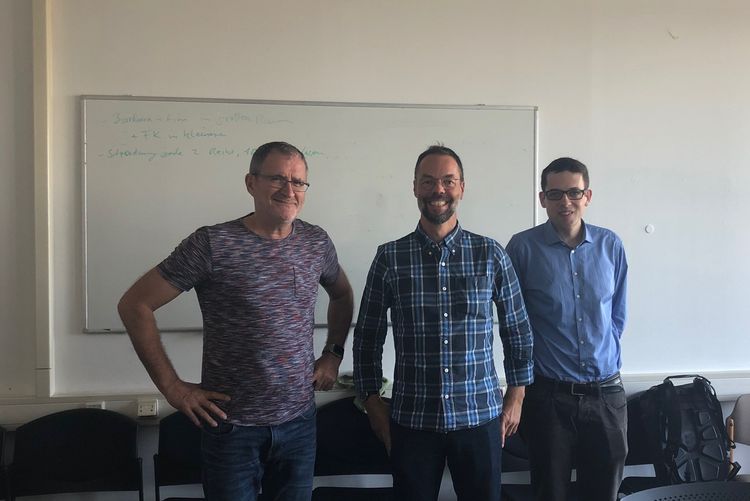
22.07.2019: Poster presentation at the "BMW Summer School"
The "7th French-German BMW Summer School 2019" took place from July 15th to 20th in Lenggries, Germany. At this event, the external doctoral student Daniel Alvarez, under the supervision of Prof. Jorge Marx Gómez, presented a poster with the title "Data architecture for vehicle data semantics and driving context reasoning". The poster is about an approach to bring vehicle data into a more understandable representation, where the meaning of data streams plays an essential role. The future work will focus on exploring the use of graph data models to represent data of moving objects (e.g., a vehicle). This research is carried out at the Department of Research of the BMW Group.
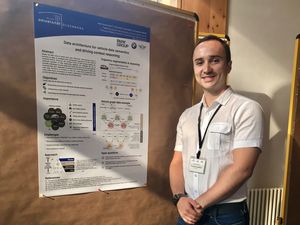
17.07.2019: Brainstorm and discussion about the first prototype of the project eco4fin
In the beginning of July, the eco4fin project team presented a platform concept to our research partner Volkswagen in Wolfsburg and participated in a training on FOSS (Free Open Source Software) deployment.
Our demonstration met the expectations and was the basis for a creative and constructive exchange between the project team and our partners. In this first phase, the focus was mainly on the desired functionality rather than on the content itself. After a productive meeting some prioritization of the next development steps took place. It was decided that some interesting ideas will be moved to future releases.
Based on the feedback of our Volkswagen partners, the project team will now be able to work continuously on the development and improvement of the first prototype. This implementation will be, by the end of the summer, fully functional concerning its main features and already introduce some secondary ones.
Furthermore, the project team took part in a training course ministered by the VW IT department about FOSS and its different kinds of licenses and related prerogatives. It is imperative to master these matters because the prototype has to be not only fully functional but also legally useable i.e. it must be possible to deploy and use it extensively within our research cooperation initiatives without any undesired legal issues.
The participants were Sven von Höveling (VLBA), Guilherme Baumgarten (VLBA), Dr. Ina Thurn (Volkswagen), Dr. Torsten Gailus (Volkswagen), Raphaela Helbig (Volkswagen) as well as the temporary project assistants Tolga Tanimaz (Master Student, VLBA) and Daniel Steinke (Bachelor Student, VLBA).

(Source: pixabay.com/de/vectors/computer-software-werkzeug-recht-3314597/)
15.07.2019: Running EU-project HPC for Smart Health
In the frame of the running EU-project HPC for Smart Health and the elaboration of a new EU Horizon 2020 project towards High Performance and Parallel Computing in Smart Cities Prof. Jorge Marx Gómez visited the Universidad Autónoma de Barcelona (Spain). Further project partners are the University of Wrocław (Poland), the Universidad Nacional Mar del Plata (Argentina) und die Universidad Nacional de San Luis (Argentina).
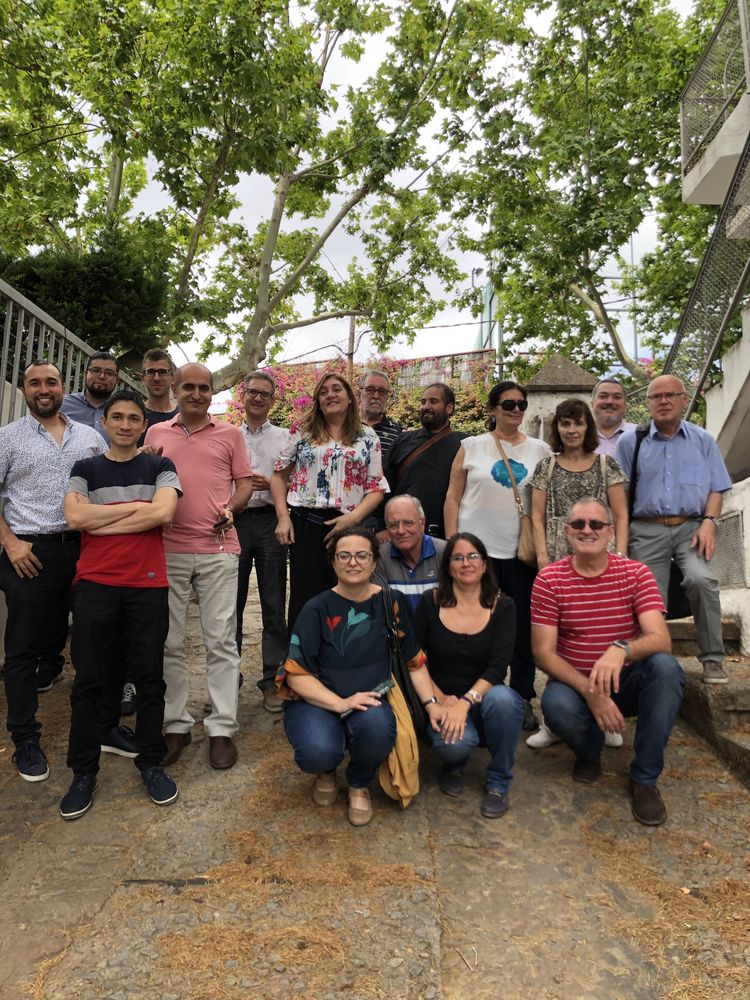
05.07.2019: Internal ECOSense Workshop specifies bicycle sensor technology
At invitation of Prof. Dr.-Ing. Jorge Marx Gómez the partners of the newly launched mFUND feasibility study ECOSense recently met for a second internal project meeting at the University of Oldenburg. The aim of the exchange with the companies Baron Mobility Service and CoSynth was to detail the tasks involved in the project. As part of the internal workshop the design of the bicycle sensors to be developed was further specified.
Requirements for the measurement technology were defined more precisely from the point of view of different target group (urban and traffic planning, test persons, research etc.). As a result the sensor technology should record not only GPS and acceleration data but also comprehensive environmental data as air pressure from the cyclists' surroundings. On the basis of the new information, the inhabitants of Oldenburg could obtain more detailed information about health-endangering influences on cyclists. Several publicly accessible demonstrators of the sensor are being developed to draw attention to the goals of ECOSense at events. These will be shown at the innovation workshop, which is expected to take place on 21st of October in the Schlaues Haus in Oldenburg. At the end of the feasibility study there will also be a public closing event to disseminate the project results.
The study ECOSense aims at the examination of the feasibility with regard to suitable parameters for a sensor system which is attached directly to the bicycle. The newly generated infrastructure and environmental data will be linked with other relevant information following an evaluation. The VLBA will work on a concept for carrying out data analyses for this purpose by the next meeting.
About the mFUND of the BMVI:
As part of the mFUND research programme the BMVI has been supporting research and development projects on data-based digital applications for mobility 4.0 since 2016. In addition to financial support, mFUND supports networking between actors from politics, business and research as well as access to the mCLOUD data portal with various event formats. Further information can be found at www.mfund.de.


04.07.2019: VLBA meets BIS
At the 22nd International Conference on Business Information Systems (BIS) (bis.ue.poznan.pl/) in Seville, the PhD students Christoph Schröer (Data Science Architectures), Christian Janßen (Data Ownership), René Kessler (AI Platforms in Small and Medium Enterprises) and Felix Kruse (Big Data Integration) presented their research topics in the Doctoral Consortium. In addition, Pajam Hassan (intuitive.ai), who is doing his PhD part-time at the VLBA, presented his full paper on the application of machine learning in supply chain risk management.
03.07.2019: Stefan Wunderlich and David Saive present their contribution to the conference
As part of the project HAPTIK Stefan Wunderlich and David Saive presented their conference paper at the International Congress on Blockchain and Applications. The conference took place in Ávila, Spain and had a very large number of visitors with international experts. The article entitled "The Electronic Bill of Lading: Challenges of Paperless Trade" was very well received and discussed by the visitors of the conference.
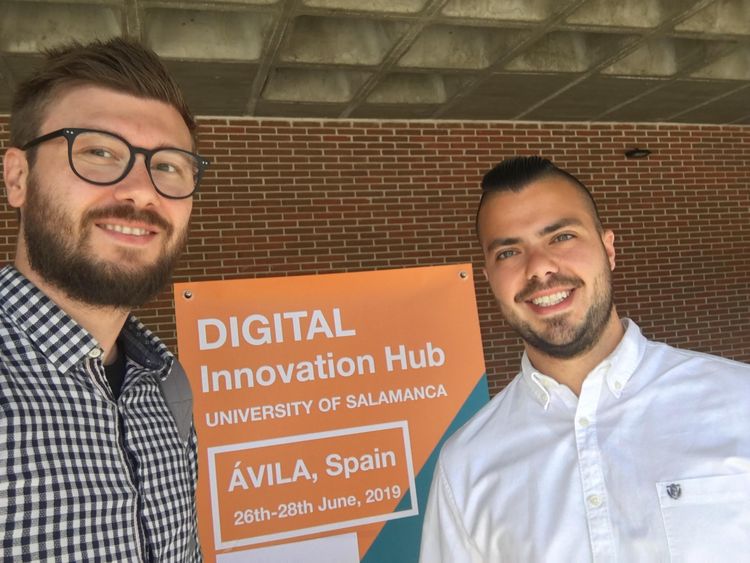
28.06.2019: Keynote lecture at the LINGA symposium "Outlook into our future"
The LINGA symposium with the main topic "Outlook into our future" took place on June 27th at the Sportakademie Hannover. After a brief welcoming address, discussions were held in four forums on a variety of issues relating to services of general interest. NEMo took part with an impulse lecture in the context of the forum "Multimodal mobility concepts in rural areas". Michael Fuder from merkWATT also reported in detail on the AUNO DOMO (Autonomous Village Mobility) project. Following the contributions, the plenum discussed how the insights gained in NEMo, for example in the form of business models, could be used in practice.
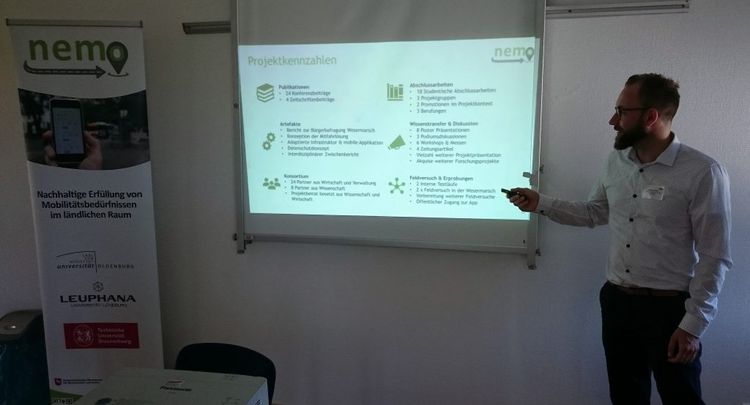 In Hanover, Alexander Sandau presented central results from NEMo.
In Hanover, Alexander Sandau presented central results from NEMo.
LINGA (Landesinitiative Niedersachsen Generationengerechter Alltag) acts as a cross-cutting platform that initiates "social innovations for generations in everyday life". Design for all" as a guiding principle shifts the focus on senior citizens away from a pure nursing theme towards a comfort benefit for all generations. Especially for rural communities and health regions in Lower Saxony, this view represents an opportunity to face the complex challenges of services of general interest in a modern and forward-looking way: this increases the quality of life - not only in old age!
In view of a society of long life, the challenges for the country are manifold and the fields of action of LINGA are very broad, ranging from technical assistance systems for older people, mobility in rural areas, tourism, retail trade and crafts, research and science to social entrepreneurship and design for all.
18.06.2019: New research project with focus on detecting cycling data started
The recently started project ECOSense aims at the development and implementation of a sensor set specifically for the tracking of cyclists. The feasibility study is financially funded by the Federal Ministry of Transport and Digital Infrastructure (BMVI) for a period of nine months within the framework of the funding programme "mFUND". The internal kickoff meeting was now held at the invitation of Professor Dr.-Ing. Jorge Marx Gómez at the University of Oldenburg. At the exchange meeting with the Oldenburg based companies Baron Mobility Service and CoSynth, in which Roland Hentschel of the economic development department of the city of Oldenburg took part as well, working tasks were specified while strategies for the dissemination of the sensor technology in the Oldenburg area and potentials for the further development of the measuring technology were discussed in detail. As part of the project there will be an innovation workshop in autumn held in Oldenburg to actively involve the 61 associated partners of ECOSense. Representatives of municipalities, transport and traffic engineering, businesses and the ADFC will discuss potentials of the newly generated bicycle data based on sensor technology. The project ECOSense will officially presented at the end of August by project manager Mrs. Kyra Pelzner (Baron Mobility Service) at the Federal Ministry of Transport and Digital Infrastructure in Berlin.
The pilot study will examine the feasibility with regard to suitable parameters for a measuring technology that is attached directly to bicycles. The newly collected data about infrastructure and environment will be linked with other relevant information and evaluated. Therefore the main focus of the activities of the Department of Business Informatics VLBA will be in the field of aggregating and analyzing sensor based bicycle data.
About mFUND:
As part of the mFUND research programme the BMVI has been funding research and development projects for data driven digital innovations for mobility 4.0 since 2016. In addition to financial support mFUND supports the networking of actors from politics, business and research with various event formats. Further information can be found at www.mfund.de.

17.06.2019: BITS meeting in Bruges specifies forthcoming working steps
From 11th to 13th of June the partners of the Interreg-project BITS (Bicycles and Intelligent Transport Systems) met up in Bruges (Belgium) for a second internal project meeting. The main goal of the exchange was the further concretization of the upcoming tasks in the recently started project. In the coming months several intelligent transport systems (ITS) with focus on cycling will be implemented in the model regions of the North Sea region involved in BITS.
The city of Bruges and the Belgian university VIVES hosted the recent meeting. Dirk De fauw, mayor of the West Flemish city, opened the trans-European meeting with a some short words of welcome. He emphasized the importance of cycling and gave profuse thanks to all partners for their engagement in BITS. The participants of the meeting traveled to Bruges from all NSR partner countries as the Netherlands, Denmark, the United Kingdom, Germany and other parts of Belgium.
During workshops on different subject areas in a 'World Café' style relevant fields of action were identified. As a result, when the partners collecting and analyzing bicycle data they will mainly focus on topics as the tracking of cyclists, the quality of bicycle infrastructures, the combination of cycling with other means of transport (such as public transport) and bicycle parking. The regions in the North Sea Region involved will implement different ITS solutions for bicycle traffic in the coming months. For instance, the city of Antwerp (Belgium) will test intelligent 3D-cameras to detect cyclists on a main road while the Dutch city of Zwolle will implement an application which aims at extending green phases for people cycling to the city centre.
The main work of the Department of Business Informatics Very Large Business Applications VLBA will be the correlation of existing and newly generated bicycle data within the framework of a newly developed CycleDataHub, which should provide interested stakeholders from all over Europe working in the field of urban and transport planning relevant information on cycling. The data should be supplied on an open data basis that the data base can be easily enriched by third parties. At the recent meeting in Bruges VLBA research assistant Johannes Schering presented a first concept for the data protection compliant handling of bicycle related data.
The next internal BITS meeting will take place from the 24th to the 26th of September at the project partner East Riding of Yorkshire in Beverley / United Kingdom. A partner meeting in Oldenburg can be expected for the year 2020.
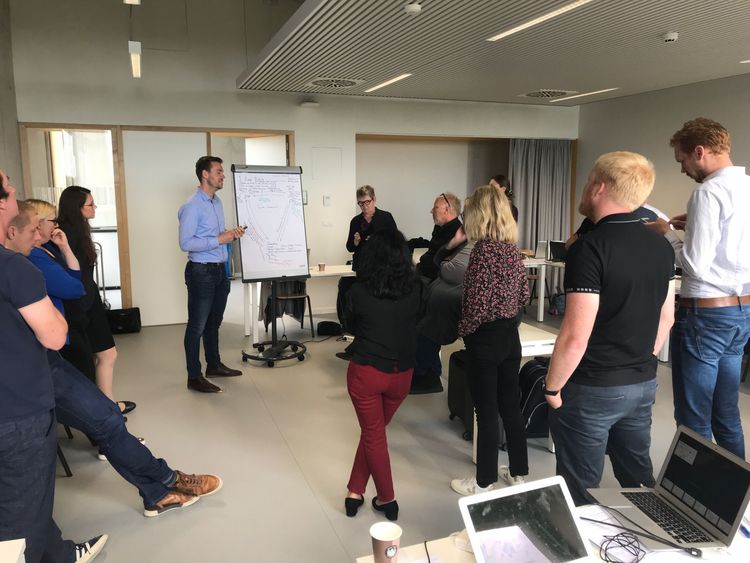
17.06.2019: BLING Blockchain conference and 2nd project steering committee meeting in Gothenburg, Sweden.
During June 17, 18 and 19, 2019 took place the 2ndBLING steering committee meeting and the public conference “Future of Blockchain in the Public Sector”. This conference in Gothenburg (Sweden) brought together learning from across six countries in Europe on Blockchain technology for government and it was possible to engage in networking with colleagues from North Sea Region countries. Guilherme Baumgarten was there representing the University of Oldenburg and presenting the use cases to be developed within the project BLING.
Link to the video:
public.3.basecamp.com/p/kGiSMM9NxswkhiAKBBrLTmpV
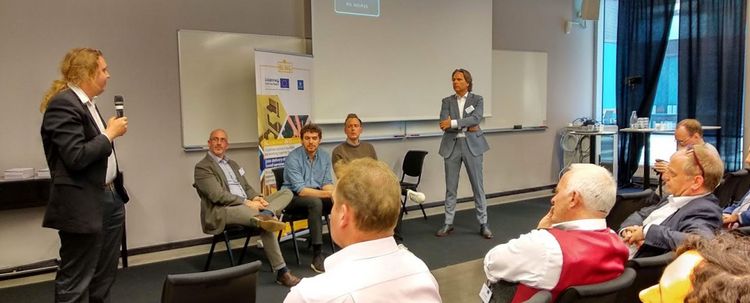
14.06.2019: Second Workshop on Research Cooperation with the OOWV
From 13.06. till 14.06. the second workshop in research cooperation with the Oldenburgisch-Ostfriesischen Wasserverband (OOWV) took place in Oldenburg. The main goal of the project WISdoM - Water Innovation Solution Management is to find out, which arrangements and actions can be implemented for the water industry to reach higher levels of digitization. As an innovative water supply association, the OOWV aims for utilizing all the chances that come with digitization and welcomes external ideas and influences to set new standards in its domain.
Among others, subject of the latest workshop was information exchange about the implementation of the arrangements and actions that were discussed and decided at the previous workshop for the departments of data- and information management, digital expertise and innovation management of the OOWV. Presentations about maturity degree models and theses within the project made the workshop complete.
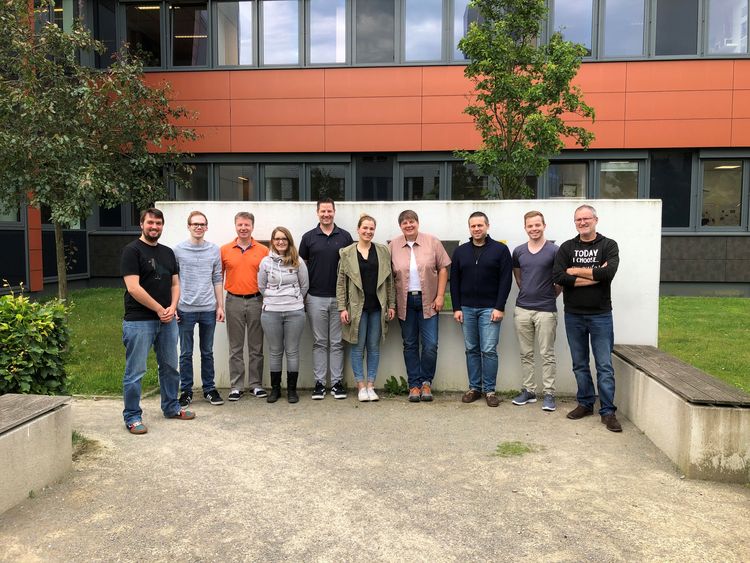
13.06.2019: Second workshop Innovation(s)Labor digital
The second workshop of the Innovative Hochschule Jade-Oldenburg! sub-project Innovation(s)Labor digital took place on June 13, 2019 under the direction of Prof. Dr. Marx Gómez (University of Oldenburg, Business Informatics) in the Schlaues Haus Oldenburg. It was specifically aimed at IT service and consulting companies. The program included science impulses on the topic of "Digitalization quo vadis? Dimensions of digital transformation and status in the region ", which were then discussed based on practical experience. In addition to content suggestions, the participants gained interesting contacts from practice and science as well as an insight into upcoming events and the continuity of the initiated exchange.
Uta Strumpel from the Chair of Entrepreneurship at the University of Oldenburg gave insights into the results of the study "Digital Innovation in the SME Business - Case Studies of Successful Digitization Projects". In a second impulse, Timo Kasselmann presented nine dimensions of the digital transformation of companies based on the St. Galler House of Digital Business.
In the second phase of the workshop, participants' experiences and the presented dimensions of digital transformation were combined to create a sentiment of digital transformation in the region.
An important result of the workshop was the realization that IT and consulting projects in the course of digital transformation are usually initiated via process digitization, product and business model innovation or customer experience. Project-relevant dimensions such as culture & expertise, transformation management, collaboration and business strategy are often not addressed or dealt with casually. How these criteria could be better integrated into project planning in the future would be a possible topic for future events.
If you are interested in similar events or in the project, please contact Malte Schulz or Timo Kasselmann of the Innovation(s)Labor digital.
09.06.2019: Participation in IEEE workshop
During the 30th IEEE Intelligent Vehicles Symposium, a paper with the title "Modeling dangerous driving events based on in-vehicle data using Random Forest and Recurrent Neural Network" was presented on June 9th by Daniel Alvarez. He is an external PhD student under the supervision of Prof. Jorge Marx Gómez and carries out his research at the BMW department of Research, new Technologies, and Innovation. The paper was part of the Workshop on "Data Driven Intelligent Vehicle Applications" organized by the Technical University of Munich.
In this study, vehicle sensor data (i.e., acceleration, speed, brake, etc.) is classified into semantic annotations of dangerous driving using supervised machine learning. A binary classifier of dangerous vs. normal driving serves as the first discriminant to decide which instances over time a relevant to consider for further enrichment. This approach aims to enable the integration of other data sources (e.g., type of maneuver, blinking rate, road type, etc.).
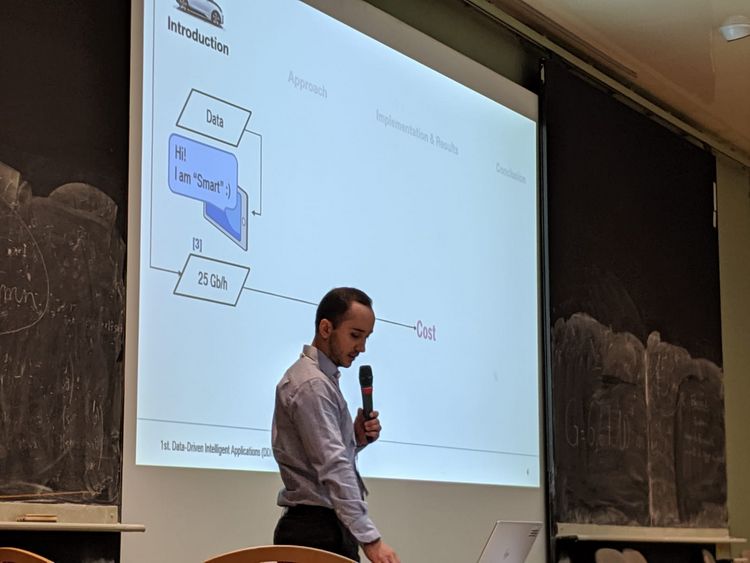
23.05.2019: Stefan Wunderlich holds presentation at KISTERS Praxisforum Energie
From 23.5. to 24.5. the KISTERS Energy Practice Forum took place in Bad Neuenahr. About 200 participants experienced a great event with various sessions, exchange of content, networking and interesting product presentations. Thematically, the event revolved around the energy management of the future. Stefan Wunderlich addressed the potential of blockchain technology in the energy sector. In particular, possible applications were presented.
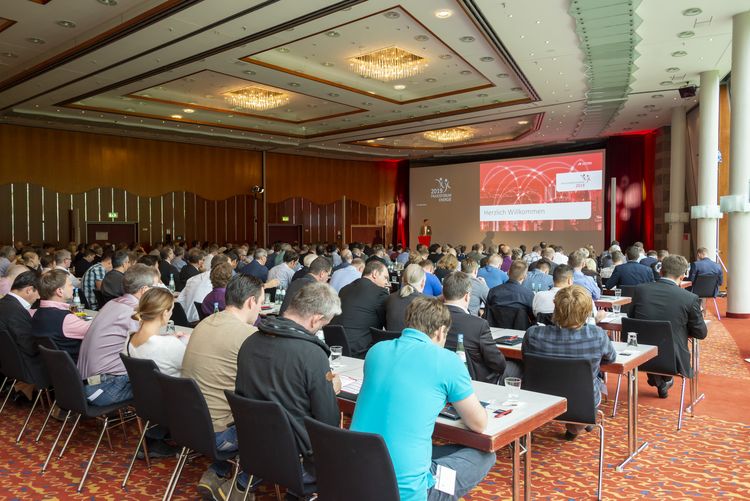
21.05.2019: OOWV visits Oldenburg University for NEMo participation
On invitation of Prof. Dr.-Ing. Jorge Marx Gómez (Chair of the Department of Business Informatics / Very Large Business Applications - VLBA) the Oldenburgisch-Ostfriesischer Wasserverband OOWV (Water Association of Oldenburg and Ostfriesland) recently visited Oldenburg University. The aim of the exchange was to identify potential points of overlap between OOWV and the current research project NEMo (funded by the Volkswagen Foundation) in the field of business related mobility. The OOWV which is an important employer in the northwest region of Germany is registering an ever-increasing growth of commuter traffics. This could be an interesting usecase for the implementation of the mobile app Fahrkreis which was developed as part of the NEMo project to improve employers mobility.
As part of the introduction to the specific circumstances of the OOWV Mr. Stephan Bäcker and Mr. Stefan Schwanke pointed out the large commuting area in the rural region of Oldenburg and Ostfriesland. Although scarcity of parking space is increasing there is only little knowledge about commuter flows. By using the application Fahrkreis in business mobility traffic flows could be recorded more systematically in order to identify potentials for carpooling opportunities in the company. For that reason a field test of the application could be realized in the coming months.
To let the employees learn more about NEMo and to answer open questions regarding the field test an information event at OOWV headquaters in the City of Brake is being planned. The exchange of OOWV and the NEMo project was initiated by the office for economic development of the City Oldenburg which was represented by Mr. Roland Hentschel at the recent exchange meeting at the University.
OOWV is an association of rural districts, towns and municipalities in the northwest of Lower Saxony, which are working together to provide consumers with drinking water and to clean wastewater. OOWV and the Department of Business Informatics are already working closely together since January 2019 as part of a research cooperation.
21.05.2019: Event Open Source Business Day 2019
As part of the Open Source Business Day 2019 (Open Source for SMEs) at the IHK Bremen, Prof. Jorge Marx Gómez gave an invited lecture entitled "Open Source in Data Science Projects for SMEs". The event was organized by the OSB Alliance (Open Source Business Alliance). Prof. Marx Gómez belongs to the extended board of the OSB Alliance.
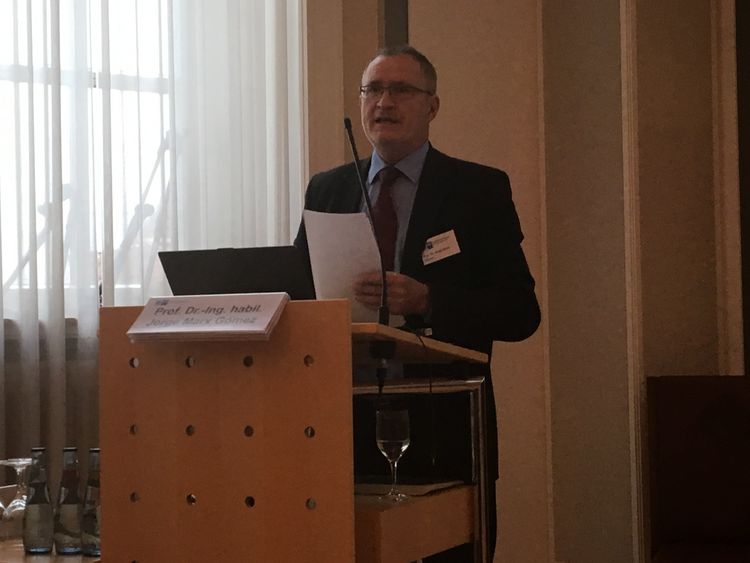
17.05.2019: Conference on sustainability topics and future issues
As part of the NachDenkstatt 2019, a conference on sustainability topics and future issues, which is organized annually for students by students of the University of Oldenburg, Prof. Dr. med. Jorge Marx Gómez held a lecture entitled "Artificial Intelligence - Between Hype and Reality".
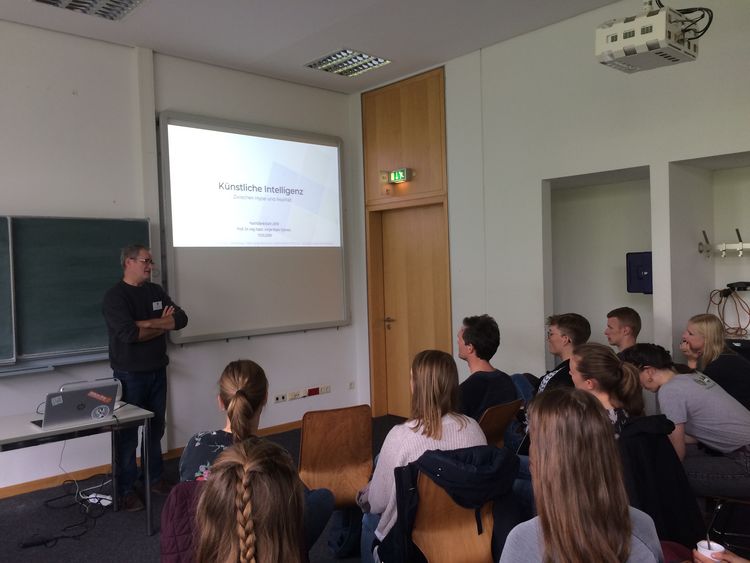
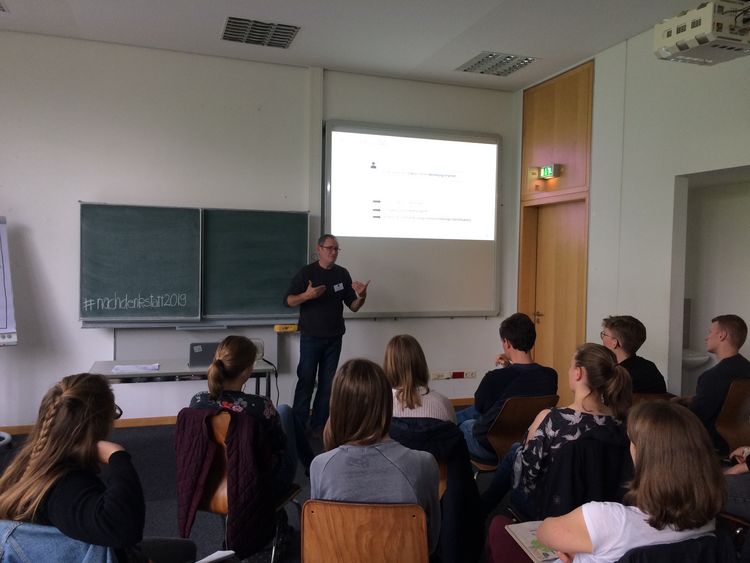
15.05.2019: Disputation of Basel Hasan
On May 15, 2019, Basel Hasan successfully defended his dissertation entitled "A Conceptual Framework for Mobile Security Supporting Enterprises in Adopting Mobility".
The Department of Business Informatics VLBA congratulates.
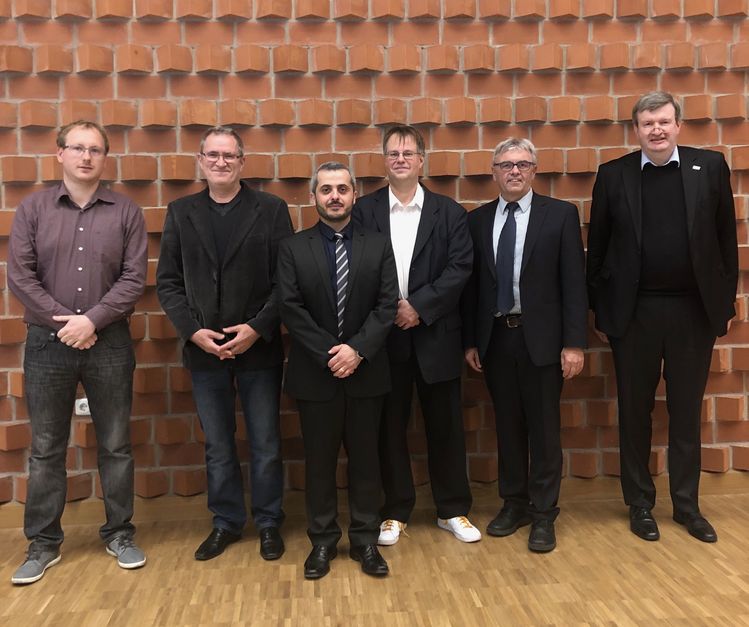
08.05.2019: International Virtual Workshop of Business Analytics Eureka 2019
The video conference of the interational eureka community took place from 6th to 8th May 2019.
As co-president of the conference, Jorge Marx Gómez hold a presentation with the titel
"Business Analytics and Business Intelligence in the context of Business Informatics".
Furthermore, Safwan Sulaiman, Daniel Alvarez, Sven von Höveling,
and Andreas Solsbach presented their submitted papers.
16.04.2019: Final presentation of the project group PROPOSE.AI
After a year full of new challenges and exciting tasks, the project has now been completed with a final presentation. On April 9, 2019, the Old Fleiwa was the venue for the final presentation. The lecture was attended by about 80 invited guests consisting of scientific staff of the University of Oldenburg, students, employees of Brille24 and other representatives of local business enterprises.
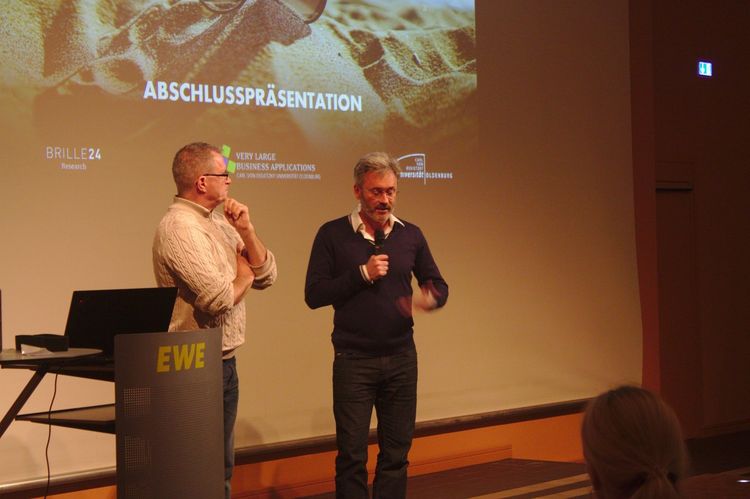
Prof. Dr.-Ing. Jorge Marx Gómez and the managing director of Brille24 Christophe Hocquet took the floor to introduce the event and appreciated the cooperation with the project group.
Stefan Zurborg opened the presentation by first presenting the framework conditions and the objectives of the project group. He then began to present the subprojects. First, the eyeglass pass reader was introduced. The reader can automatically read the values from a spectacle passport.
Next Robert Albrecht, who presented the subprojects eyeglass consultant and social media trend analysis, took over. The eyeglass consultant extracts facial features such as skin and hair color, gender, age and facial shape using neural networks and recommends glasses for the customer based on these features. Subsequently, a mapping is carried out, which combines the characteristics with the matching glasses.
Jannis Oeltjen has taken over the moderation for the next subproject. He introduced the subproject Brillentinder. The aim of this subproject was to capture the subjective preferences of the customer by guiding him to his desired glasses using intuitive wipe-gestures. As a technical solution embeddings were presented. The characteristics of the glasses are represented in an n-dimensional space. By like or dislike of the proposed glasses the next recommendation moves in the direction of the proposal or in its opposite direction.
Jannis Oeltjen has taken over the moderation for the next subproject. He introduced the subproject Brillentinder. The aim of this subproject was to capture the subjective preferences of the customer by guiding him to his desired glasses using intuitive wipe-gestures. As a technical solution embeddings were presented. The characteristics of the glasses are represented in an n-dimensional space. By like or dislike of the proposed glasses the next recommendation moves in the direction of the proposal or in its opposite direction. The subprojects are based on an elaborate architecture. This was also presented by Jannis. The focus of the Cloud-First architecture was on scalability and easy extensibility.
Finally, Stefan summarized the subprojects presented. For each subproject a stand was prepared with live demos and information material.
The project group would like to thank the practice partner Brille24 and the department Very Large Business Applications for their cooperation and say goodbye.
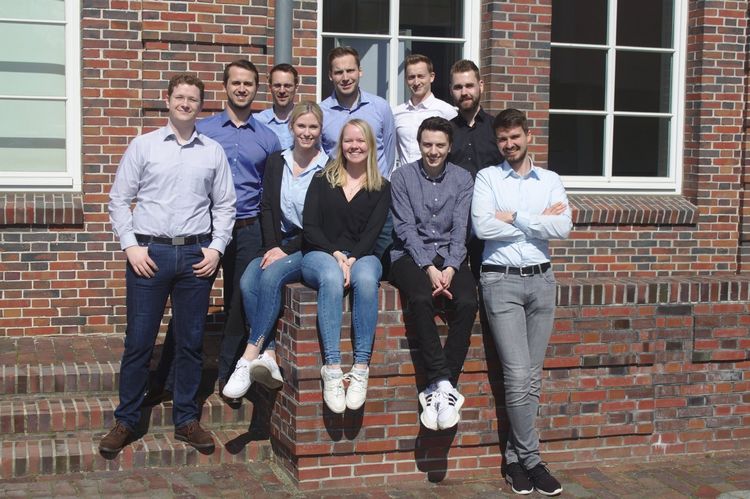
10.04 / 11.04.19 VLBA presents practical research results at the Big-Data.AI Summit in Berlin # BAS19
#BAS19 is becoming a meeting place for experts and practitioners who want to go beyond the hype and dive into the depths of the big data and AI revolution. 100 presentations were held in front of more than 8000 visitors on two days. The presentation focused on three core areas:
Cross-industry big data and AI strategies, technologies and trends that drive the digital transformation of companies.
Concrete applications of Big Data and AI in leading industries such as healthcare, finance and information security.
Ethnic and political issues currently dominating the social debate on Big Data and AI.
At #BAS19, Fatih Inel (CEWE) and Felix Kruse (VLBA) gave a presentation on the organizational optimization of data science projects in companies. Both presented their results regarding the organizational improvement of data science projects by means of the Data Product Profile, which they developed in a joint research project. The topic was very well received, so that there was still extensive and constructive discussion afterwards. If you are interested, additional information on the Data Product Profile (here) is available. The VLBA was also represented by René Kessler and Sven von Höveling at the event in Berlin.
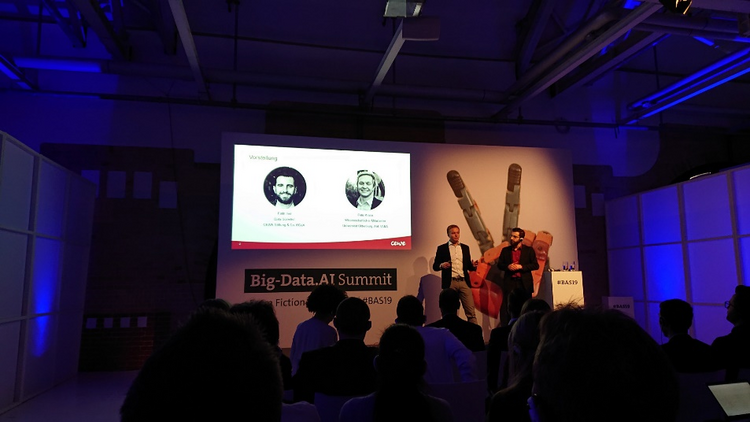 Felix Kruse (left, VLBA) und Fatih Inel (right, CEWE)
Felix Kruse (left, VLBA) und Fatih Inel (right, CEWE)
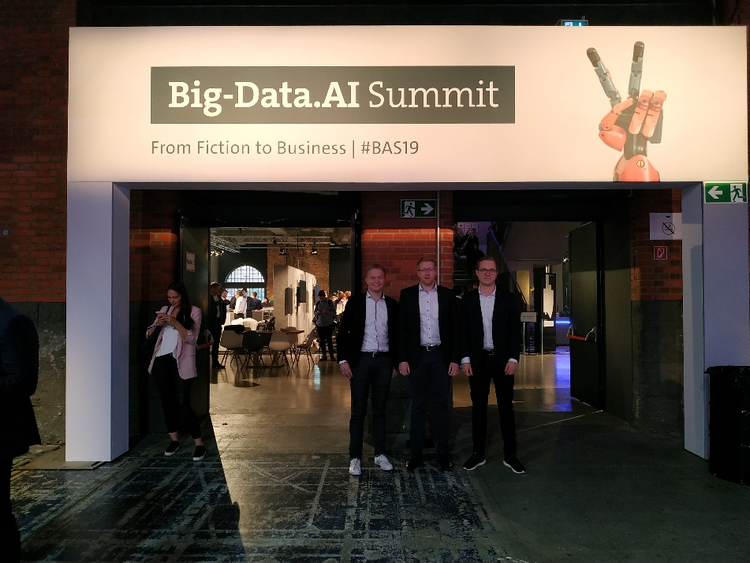 VLBA was represented by (from left) Felix Kruse, Sven von Höveling and René Kessler.
VLBA was represented by (from left) Felix Kruse, Sven von Höveling and René Kessler.
18.03.2019: Guest at the University of Oldenburg (Department of Information Systems - VLBA)
Prof. Dr. Manuel Mora (University Aguascalientes, Department of Information Systems) will be visiting the Department of Information Systems VLBA from March 18-29, 2019. During his stay Prof. Mora will give two research lectures and participate in the VLBA research colloquia. Prof. Mora is also active as a second reviewer in two doctoral procedures.
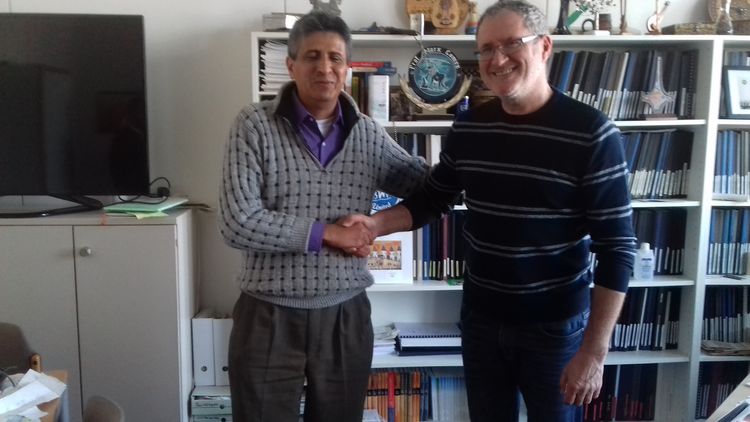
13.03.2019: "Data - Economic good?!" - Workshop of the Innovation(s)Labor digital
The first workshop of the Innovation(s)Labor digital on the topic "Data - Economic Good?", which took place in mid-March 2019 in the Schlaues Haus (schlaues-haus-ol.de/), was marked by stimulating discussions and interaction. In addition to insights and impulses regarding content, the participants also gained interesting contacts as well as anticipation and motivation for upcoming events and the continuation of the exchange that had begun.
Prof. Marx Gómez introduced the workshop with greetings and a round of introductions of the practitioners and scientists. The project members Timo Kasselmann and Malte Schulz then presented the Innovation(s)Labor digital as an interface between science and practice on digitization topics and led the way into the three workshop tracks with a technical examination of digitization:
- Creating the basis: Identification and availability of valuable data
- Data analysis: data, patterns, competitive advantages?
- The "new resource" data: Do companies have to reinvent themselves?
The experiences and ideas of the participants were collected, discussed and structured in small groups on the respective topics.
The project staff would like to thank all participants for their active participation and the lively response. If you were not present at the event and are interested in the project, please do not hesitate to contact us (digilab@ihjo.de).
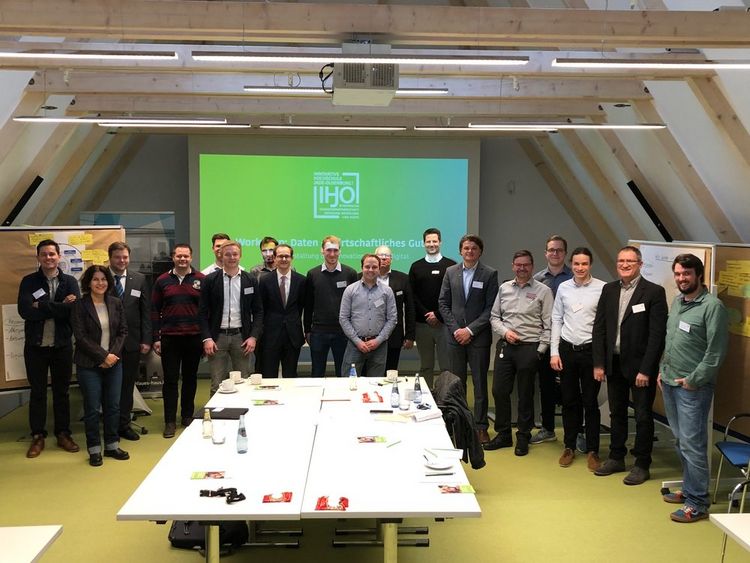
11.03.2019: Presentation of the results of the research projects "Early Warning System" at CEWE Stiftung & Co. KGaA
As part of the cooperation between the University of Oldenburg (Department of Business Informatics / VLBA) and the CEWE Stiftung & Co. KGaA, the results of the research projects of two students will be presented on 11 March 2019 at the CEWE premises.
The research projects focus on the early detection of order anomalies in production. For this purpose, KPIs are formed from the data of the order tracking system POD and compared with the individual orders. If this results in high exceedances, an order is marked as potentially faulty and marked for closer examination or restarted.
07.03.2019 New BITS project will reduce CO2 emissions by 9 % and increase bicycle use by 10%!
A new multi stakeholder project on Bicycle and ITS (Intelligent Transport Systems) aims to reduce CO2 emissions by 9% and increase bicycle use by 10% within target groups!
Under the BITS project ten partners from top cycling countries (NL, DK, BE) or those about to become (UK, DE) came together in a consortium to raise awareness of best practices of “Smart Cycling”, and to provide implementers with ready-to-use information and evidence from different regions. This project is believed to be the only one of its kind in the world.
The BITS project, co-funded by the North Sea Region (NSR) Programme, has a budget of 5 million of euros over 3 years. On 7-8 March 2019, a kick-off meeting was held in Zwolle, the Netherlands.
The Province of Overijssel, leads the overall project. Marjolijn Boot, the Head of the spacial planning and mobility unit in the Province of Overijssel, welcomed the delegates and commented: “We are very eager to find new smart IT solutions to make the use of the bike even more attractive for people. With the world leading stakeholders in cycling we look forward to achieve smart cycling solutions for the society as whole.”
At the end of the project, the demonstration of ITS applications and collected cycling data will allow stakeholder worldwide to use these data for applications and policies. The effectiveness of ITS solutions will be evaluated, challenges identified, and results disseminated to other regions.
For more information please click here.
ENDS.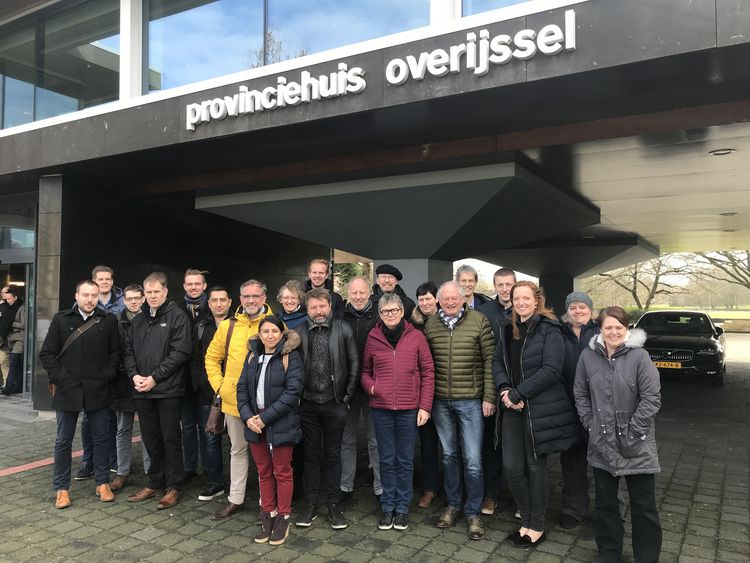
28.02.2019: Guest visiting the University of Oldenburg (Department of Information Systems - VLBA)
From 28 February - 15 March 2019 Dr. Baby Gobin (University of Mauritius, Department of Computer Science and Engineering) will be visiting the Department of Information Systems-VLBA. During your stay, Dr. Gobin will give two research lectures (Software Engineering) for master students and doctoral students of Business Informatics and participate in the VLBA research colloquia.
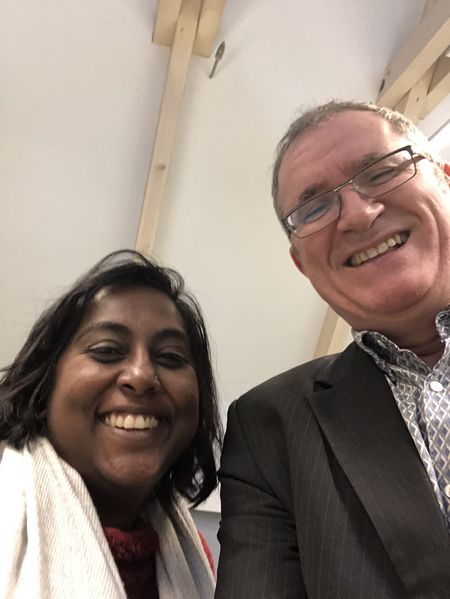
23.02.2019: eco4fin presents itself at the 14th International Conference Business Informatics
Is there a bottleneck in sustainability communication between companies and investors? Yes, summarizes the external doctoral student of the VLBA Raphaela Helbig.
She is part of the eco4fin project. At the 14th International Conference on Information Systems (WI2019) she presented her conference paper showing a technical process model of sustainability communication within the capital market.
During the conference eco4fin was also represented by Prof. Dr.-Ing. Jorge Marx Gómez, Sven von Höveling, and Dr.-Ing. Andreas Solsbach.
The 14th International Conference on Business Informatics took place from 23rd to 27th of February 2019 in Siegen under the motto "Human Practice. Digital Ecologies. Our Future".
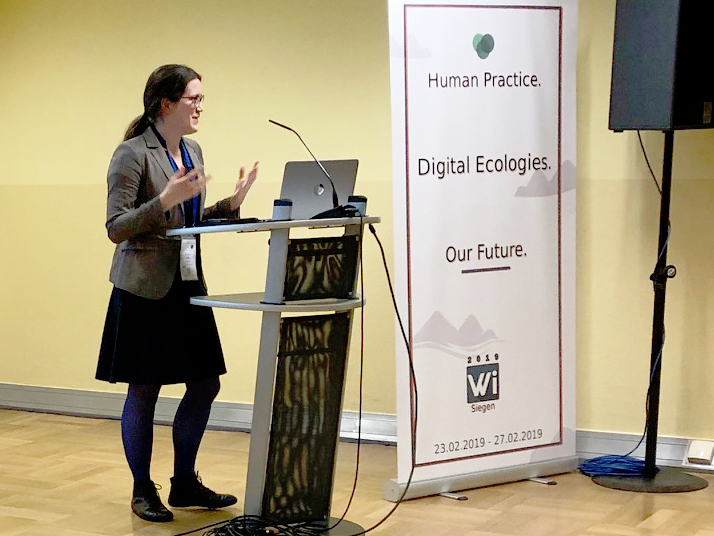
07.02.2019: Interreg Project BLING Kickoff Meeting
From 7-8 February 2019 the kickoff meeting for the Interreg project BLING (BLockchain IN Government) took place in Zwolle (Netherlands) with the participation of 13 partner institutions.
The BLING project, with a budget of approximately five million euros, is funded by Interreg within the framework of the North Sea Region (NSR) programme over a period of three years.
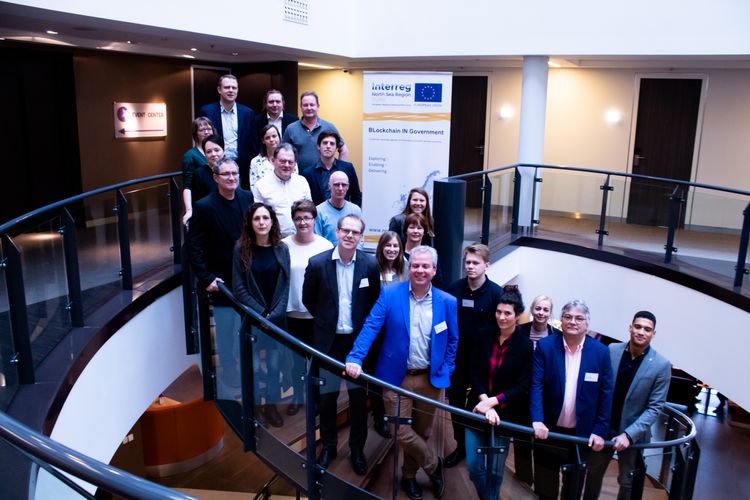
28.01.2019: Empower Generations at Student Information Day
At the student information day Stefan Wunderlich presented the basics of the blockchain to interested guests of the university. The focus of the lecture was the technical conception of the Bitcoin network. More than 100 listeners were very interested in the topic, followed by a short discussion about Blockchain.
21.01.2019: Project "HAPTIK" successful started
In 2010, a total of 60,053 bio. ton-kilometers were shipped. Ac- cording to estimates, this number is expected to quadruple in 2050. In the peak year 2008, before the global economic crisis, Germany handled a total of more than 316 million tons of goods.
Modern merchant shipping is characterized using many different documents. The documentation obligations range from the keeping of ship certificates, the creation of ship's diaries, to transport documents which are necessary for the actual transport.
The most important document of freight transport is still the Bill of Lading (B/L). It fulfils several functions: It proves that a good has been taken over by the carrier. Also, it certifies the obligation to deliver the goods to the place of destination and to deliver them to the consignee. Furthermore, the transfer of ownership of the goods listed in the B/L can be replaced by the transfer of the B/L (document of title).
Until now, it has been necessary for the B/L to be handed out in paper form so that the participants in the transport process are able to verify the documents. This process requires an immense amount of time and money. German lawmakers have recognized the need for electronic B/L. With the introduction of sec. 516 par. 2 German Commercial Code, electronic records of the B/L have become equivalent to a paper-based B/L.
The central goal of the project is to develop a platform based on blockchain technology that enables the creation and trading of digital tokens as B/Ls. The distributed structure creates trust and transparency. In order to achieve legal compliance and penetration of the maritime domain the following steps are necessary.
- Legal analysis of the functional equivalence of the electric bill of lading,
- Development of simple and understandable terms of use in cluding data security and data protection declaration,
- Development of a blockchain architecture with a view to ex pandability beyond the electric B/L.
- Implementation of a platform to create, administer, and trade electronic B/L,
- Integration of electric B/L platform with existing system landscapes of logistics service providers,
- Integration of plaform-services and -users in the Maritime Connectivity Platform (MCP) to establish a global service- and identity management,
- Demonstration of service within the research platform eMIR,
- Creation of acceptance in the market by founding the non-profit electronic Bill of Lading organization (eBLO).
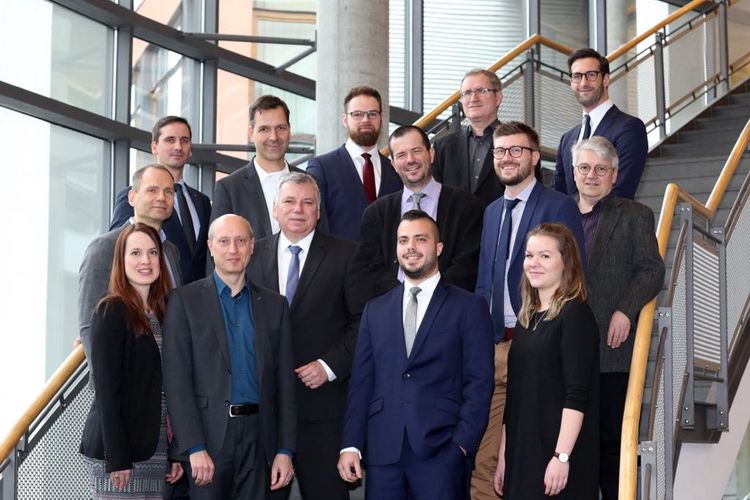
18.01.2019: Webinar at abat AG
On 18 January 2019, a webinar on the topic of AI took place in the abat AG headquarter. Carsten Manske (abat AG) and René Kessler (Uni OL) got to the bottom of the question: "How can companies make supply chain processes in SAP more intelligent with the help of machine learning?“
The speakers illustrated the possibilities and limitations of the technology and underpinned this with three implemented examples:
- Routing Optimization through Reinforcement Learning
- Improvement of customer service through the use of adaptive chatbots
- Demand forecasting and capacity planning with neural networks
